








EDITOR Fran Ostendorf
DESIGN & LAYOUT Alex Foster
ADVERTISING DEPARTMENT
Peter Zeldin | 401-421-4111, ext. 160 pzeldin@jewishallianceri.org
CONTRIBUTORS Bob Abelman, Ruth Marris Macaulay, Sarah Greenleaf, Robert Isenberg, Emma Newbery
COLUMNISTS Michael Fink, George M. Goodwin, Patricia Raskin, Rabbi James Rosenberg, Daniel Stieglitz
VOLUME XXXI, ISSUE XIV
JEWISH RHODE ISLAND (ISSN number 1539-2104, USPS #465-710) is published monthly except twice in May, August and September.
PERIODICALS POSTAGE PAID at Providence, R.I
POSTMASTER Send address changes to: Jewish Rhode Island, 401 Elmgrove Ave., Providence, RI 02906.
PUBLISHER
The Jewish Alliance of Greater Rhode Island, President/CEO Adam Greenman, Chair Harris Chorney, 401 Elmgrove Ave., Providence, RI 02906.
401-421-4111; Fax 401-331-7961

MEMBER of the Rhode Island Press Association.
COPY DEADLINES: All news releases, photographs, etc., must be received on the Wednesday 10 days prior to publication. Submissions may be sent to: editor@jewishallianceri.org.
ADVERTISING: We do not accept advertisements for pork or shellfish. We do not attest to the kashrut of any product or the legitimacy of advertisers’ claims.
ON THE COVER : PHOTO | iStock image.
I HAVE TO SAY I have always loved this time of year. Cold crisp days with all that bright sunlight. I love a good snowstorm as long as I don’t have to venture out in it, so December is good for me. Not usually as much snow this month as during the rest of winter.
Cozy sweaters and long sleeves are finally doing their jobs to keep me warm. You don’t have to answer to folks who ask why you are wearing a sweater when temps climb above 50 at noontime if it’s freezing in the morning.
And there are the lights cutting through that early darkness everywhere. You have to admit that even though you may not celebrate the holidays that many of those lights symbolize, they do make early darkness a lot easier to take.
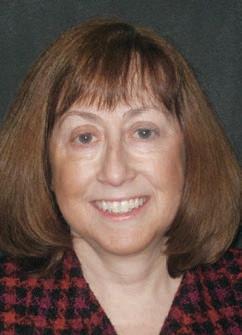
And Hanukkah is coming. It’s really the story of hope and perseverance and a miracle to top it all off. And it’s a family time filled with joy and food and light.
Who can’t use a little bit of all of that?
No matter how you feel about the world at large, it’s been another tough year. We have become a fractured country, politically and ideologically. Antisemitism and hate crimes are up. Civility seems to be down.
According to the ADL, as reported in the New York Times, the number of reported antisemitism cases surged in the last year, tripling since Oct. 7, 2023. And in 2023, the group reported a 140% increase over the year
Our Jewish community needs your help bringing news, people and events to life on the pages of Jewish Rhode Island.
If you’ve worked in media or marketing; want to have a chance for a byline of your own; love writing and storytelling; love meeting people and exploring new things, we’re looking for a couple of freelance writers to help cover our diverse community – from Woonsocket to Westerly. We’re looking forward to hearing from you.
Please send a resume or a description of your background and links to something you’ve written to Fran Ostendorf, editor, Jewish Rhode Island: editor@ jewishallianceri.org.
before. From Oct. 7, 2023 to Sept. 24, 2024, ADL identified more than 10,000 incidents, divided into categories such as verbal or written harassment, vandalism and physical assault.
And the top five states with highest number of recorded incidents included Massachusetts in fifth place. Final reports for 2024 won’t be released until spring, 2025. Regardless, these numbers are daunting and unsettling.
We need to all work toward a safer and more secure environment. In the coming year, we hope to examine some of the issues surrounding antisemitism locally and how it’s impacting your life.
Here at Jewish Rhode Island we are thankful for all our readers and hope you will continue to submit your news, simchas and letters to the editor. Tell us where you are and where you’ve been through our “We are Read” feature.
We have wonderful advertisers who provide critical support for our newspaper and website. We hope you will remember them when you need a service that they provide.
We will be printing a little later in January. So, look for your print newspaper on Jan. 10, 2025. Don’t forget there will be an electronic newsletter on Dec. 19. And we are online 24/7 at JewishRhody.org with news updates and our Israeli newspapers pages.
Hag Hanukkah sameach! May the lights of your hanukkiah shine brightly again this year and every year!


727 EAST AVE • PAWTUCKET, RI 02860 (401) 205-8560 • MAVENSDELI.COM
EAST AVE • PAWTUCKET, RI 02860 (401) 205-8560 • MAVENSDELI.COM
Fran Ostendorf, Editor


and
and giving voice to the diverse views of the Jewish community in Rhode Island and Southeastern Massachusetts, while adhering to Jewish values and the professional standards of journalism. ALL SUBMITTED CONTENT becomes the property of Jewish Rhode Island. Announcements and opinions contained in these pages are published as a service to the community and do not
Alliance of Greater Rhode Island. We reserve the
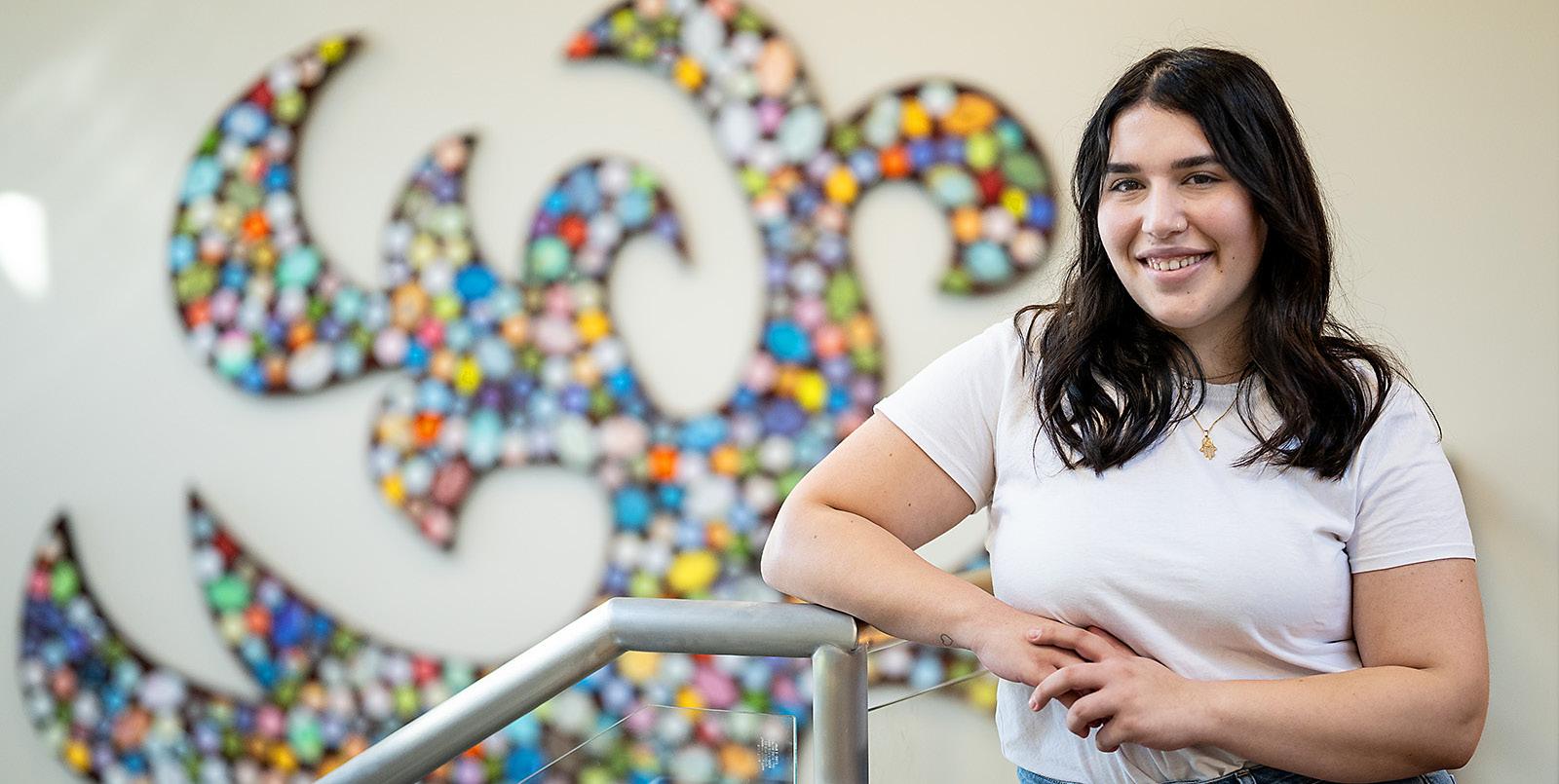
Facebook cooking videos. Hebrew word of the day. A friendly face bringing Israel to area religious schools and organizations.
RHODE ISLAND’S newest shlichah (Israel emissary) is already setting a different path at the beginning of her two-year stint in Rhode Island. And she’s anxious to meet you and all the members of the Rhode Island Jewish community. She wants to experience all that the Ocean State has to offer, she told Jewish Rhode Island in a recent interview.
Gaya arrived from Israel at the end of August, and she says she’s settled in quite nicely thanks to the welcoming nature of our community.
“Even before I got here, people were messaging me. I’m a family person. Getting all these messages was so nice. It’s so warm and since the beginning I have felt so good here, she said. “This was definitely the right thing for me.”
We aren’t allowed to use her last name in our stories due to security concerns. But we can tell you that you will see the 22-year-old throughout Rhode Island as she brings a little bit of Israel to everyone in the state as well as to southeastern Massachusetts.
A native of Karmiel in northern Israel, she recently lived in Tel Aviv for a year where she worked for an insurance company after her military service. (We can’t really talk about that either, sorry.). She grew up in Karmiel, a city she characterizes as good for families and filled with green spaces, with her parents and three sisters. Two sisters are older, and one is younger, and she is close to the whole family. In the family of girls, even her dog is a girl!
Her oldest sister is married, and the next oldest sister recently announced her engagement. Through the power of FaceTime, she can chat with them daily and she can watch her 2-year-old niece grow.
She calls her niece the “light of my life.”
“Keeping the connection between us is super important. I don’t think I would have been able to do it without FaceTime,” she says.
She has participated in the Diller Teen Fellows program in Pittsburgh and was also a part of the Scouts movement, where she guided children from 4th to 12th grade. She applied to be a shlichah while she was working in Tel Aviv.
The shlichim program, organized by the Jewish Agency for Israel, connects young emissaries with organizations in the United States.
Gaya is one of about 2,300 shlichim currently working in the U.S. for organization sponsors ranging from communities to camps.
Gaya’s hobbies and interests include volunteering, traveling and exploring different cultures. In her free time, she loves to watch movies and create arts and crafts projects. She is passionate about Jewish holidays, cooking, baking and preparing traditional Israeli dishes.
Gaya says she looks forward to adding her personal touch to her time as a shlichah. The Israeli Culture Series will continue, and she hopes to lead activities to highlight Israeli food and alcohol. And she says she likes to drive, so we may see some travel activities.
“I’m a very warm person,” she says. “If people get to know me, they
see that.”
We asked her to tell us a few things that the Rhode Island community might find interesting.
Favorite food: “My mom’s stuffed zucchini.” (You can find the recipe on Gaya’s Facebook page.)
Pets: “We have a dog who is so sweet. She’s between 11 and 13 years old.” Her oldest sister has a dog who is Gaya’s dog’s son!
“I’ve had almost any kind of pets. Bunnies, parrots, and we had snakes when I was young. And lizards. Any kind of pets you can think about.” They even had a cat named Bisseli.
Favorite leisure activity: “Spending time with people I love. Walks with people I love. Watching movies together.”
What we can do to help you in your job: “Ask me questions about Israel I’m happy every time I get to do that. Also continue to be warm and welcoming.”
“I love where I live,” Gaya says. “It’s only the start and already I love what I’m doing.”
FRAN OSTENDORF (fostendorf@ jewishallianceri.org) is the editor of Jewish Rhode Island.
One of my favorite Hanukkah songs is “Light One Candle,” written by Peter Yarrow of Peter, Paul and Mary fame. He captured the true essence and meaning of the holiday through his lyrics. The chorus is: “Don’t let the light go out! It’s lasted for so many years! Don’t let the light go out! Let it shine through our hope and our tears.”
HANUKKAH, which was originally a minor holiday that the rabbis of the Talmudic period initiated as a way of celebrating the historic victory of the Maccabees over the Greeks, has become more significant over the past few years because of the themes inherent within the holiday.
The Maccabees were fighting for their right to practice their reli gion against the Greek edict that required the Jews to adopt Hellenistic beliefs and incorporate the Hellenistic values and lifestyle. While there were Jews for whom that was not a problem, the Maccabees understood that if they all obeyed, Judaism would cease to exist as a civilization; we would have become absorbed into the larger Greek culture.
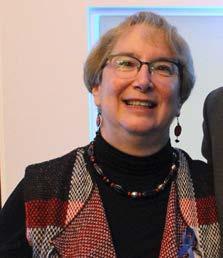
By celebrating Hanukkah, we are affirming our right and our pride in being Jewish and as such, each year as we light the candles, we are
also re-dedicating ourselves to our commitment to be Jews and to live our lives as Jews. The rabbis, when they set the rituals for its observance, all stated that we are supposed to place the menorah in a window for everyone to see (except when times were too dangerous to do that). As such, they were connecting the ritual with this value of pride and affirmation of our Jewish identity. Our contemporary environment has some similarities with the time during which the Maccabean revolt took place. In the same way that the Hellenistic lifestyle and values were more attractive to some Jews than living Jewishly, so too, today, there are Jews for whom their Jewish identity is not as important to who they are. There are external influences that encourage us to blend in and not identify
as Jews, and just the Jewish community was fractured into different sects during that period, so too, today, there are various factions, some of whom hold diametrically opposite views. We are fragmented through disagreements over religious observance levels, over the right of Israel to exist, over what it means to be Jewish. We label each other, accusing some of just being Jew-ish, and others of being out of step with contemporary understandings. Similar disagreements allowed the Greeks to gain a foothold in the 2nd century B.C.E. and ultimately, they also were one of the contributing factors that led to the destruction of the Second Temple.
As antisemitism continues to rear its ugly head, it is even more incumbent upon us to live actively as Jews and to become more unified as a people. Many of us want to respond to the growing antisemitic environment by retreating and hiding our identity. It can make us feel too vulnerable and become easy targets if we advertise our Jewish identities.
However, we carry with us the responsibility to stand up to hatred and ensure that future generations have the right to live as Jews in the same way that the Maccabees fought the Greeks to make a stand and protect their ability to remain Jewish. We need to support each other and find ways to
connect, even when we disagree about core principles because, in the end, we are all Jews.
The Jewish phrase, ‘Kol Yisrael Aravim Zeh B’Zeh”: ‘All Israel is Responsible for One Another’, does not make distinctions or create categories as to who is a better Jew or a legitimate Jew. We are all Jews, and we need to find ways to overcome our differences so we can strengthen our whole community and protect ourselves from the ever-present external forces that wish to do us harm.
As one of the verses in the song states:
“Light one candle for the strength that we need,
To never become our own foe;
And light one candle for those who are suffering
Pain we learned so long ago.
Light one candle for all we believe in
That anger not tear us apart.
And light one candle to find us together
With peace as the song in our hearts.”
So, light the candles in a window, participate in communal programs, and show
your pride in your Jewish identity, however you define it, through active involvement and participation! May you have a happy, meaningful and spiritual Hanukkah.
RABBI ANDREA M. GOUZE is currently the rabbi at Temple Beth David of the South Shore in Canton, Ma. She is also a Board-Certified Chaplain through NAJC: Neshama: Association of Jewish Chaplains.
Candle lighting times
December 2024
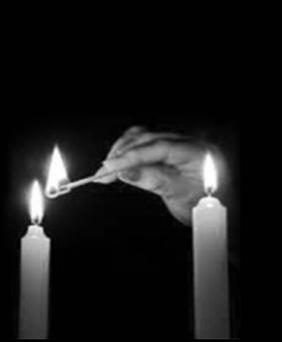
Greater Rhode Island
December 6 3:55pm
December 13 3:56pm
December 20 3:58pm
December 27 4:02pm Hanukkah/ Shabbat
BY RON KAMPEAS
(JTA) – WASHINGTON – Sen. Chuck Schumer, the New York Democrat, is ready to relinquish his title as Senate majority leader, but the most senior Jewish elected official in U.S. history will get to remain the leader of what will be a minority caucus in the next Congress.
Senate Democrats reelected Schumer as their leader on Tuesday, a validation after a tough election for the party, which lost control of the
White House and the Senate and failed to regain the U.S. House of Representatives. Schumer was unopposed and the vote was unanimous.
As of Jan. 3, Schumer will lead a minority in a chamber split 47 Democrats to 53 Republicans, as opposed to the 51-49 Democratic majority he has led since January 2023.
Democrats lost seats in West Virginia, Montana, Pennsylvania and Ohio, but Schumer got credit for helping to keep four other states
Democratic in close elections: Arizona, Wisconsin, Nevada and Michigan. The 2024 map was much tougher for Democrats than Republicans, with Democrats having to defend 24 seats and Republicans having to defend just 10.
In remarks after the vote, Schumer alluded to the fact that Republicans are still seven shy of a filibuster-busting 60 votes and would need Democrats to get legislation passed.
“Our preference is to secure bipartisan solutions
wherever possible and look for ways to collaborate with our Republican colleagues to help working families,” Schumer said. “However, our Republican colleagues should make no mistake about it, we will always stand up for our values.”
In the few weeks he remains majority leader, Schumer has much on his plate, including getting approved a slate of federal judges nominated by President Joe Biden. He has also vowed to push through a
version of the Antisemitism Awareness Act, which would enshrine into law the International Holocaust Remembrance Alliance definition of antisemitism. The IHRA definition is controversial and opposed by a number of Democrats who see its definitions of antisemitism relating to Israel criticism as over broad. A few Republicans in Congress oppose the definition because they believe it prohibits elements of Christian belief.
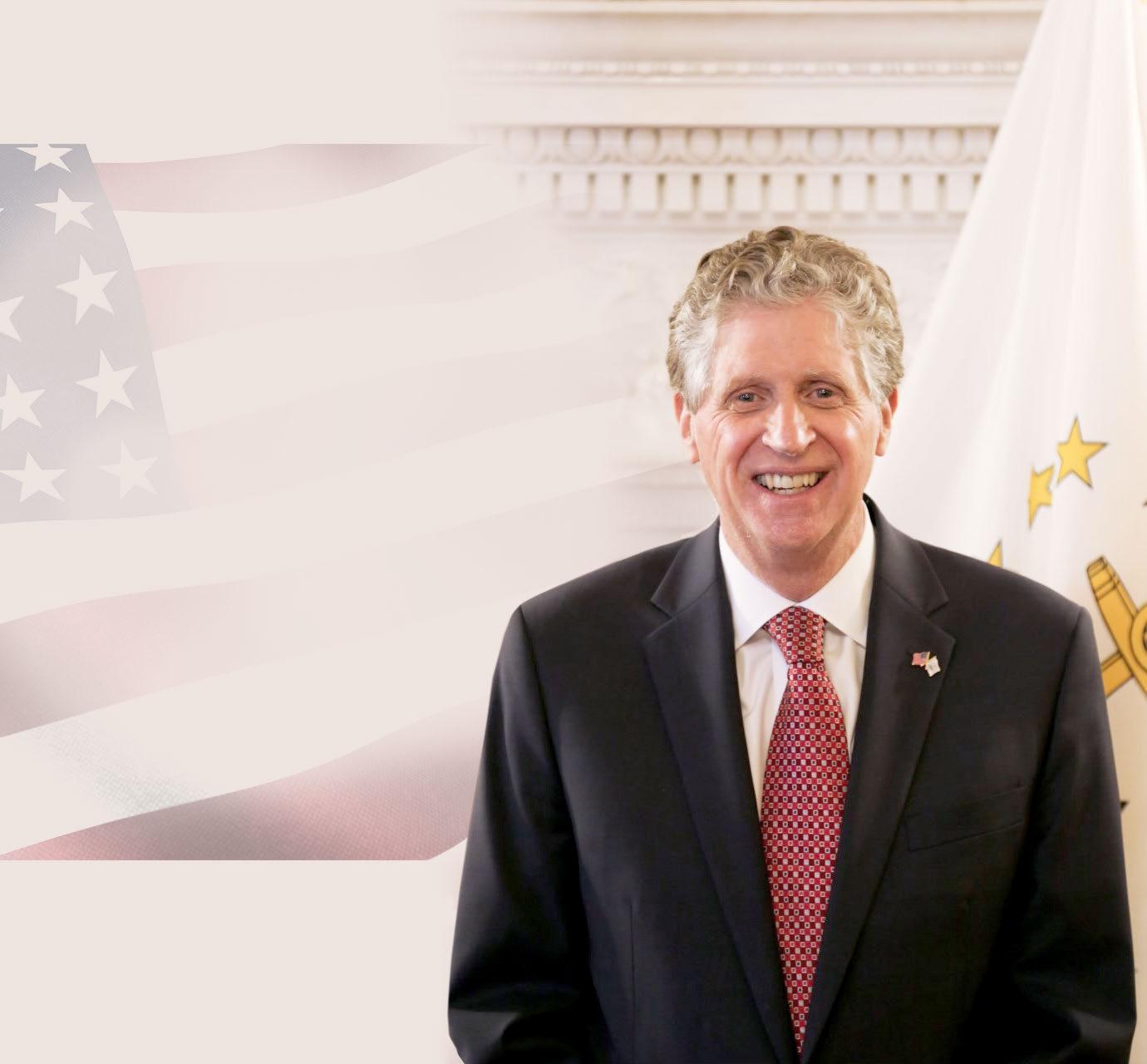


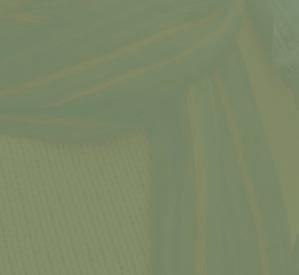





FOR COMPLETE MONTHLY LISTINGS, VISIT JEWISHRHODY.ORG
Ongoing
Kosher Senior Café and Programming. 11 a.m.-1 p.m. Monday – Thursday at the Dwares JCC, 401 Elmgrove Ave., Providence; Fridays at Temple Sinai, 30 Hagen Ave., Cranston. In-person (and on Zoom Tuesdays, Wednesdays and Thursdays) programming from 11 a.m.-noon followed by lunch and discussion noon-1 p.m. On Wednesdays, programming is chair yoga with Neal. For seniors aged 60 and older as well as younger adults with a disability; all faiths and backgrounds are welcome. 12/25/24: café closed. 12/20/24: Hanukkah Party at the Dwares JCC; reservations required by 12/13/24. Suggested donation: $3 per lunch. The Kosher Senior Café is a program of Jewish Collaborative Services and is supported by the Jewish Alliance of Greater RI and Blackstone Health. Information and RSVP, Neal at neal@jfsri.org or 401-421-4111, ext. 107.
Finding Light in Times of Darkness Pre-Hanukkah Series for Women. Monday nights thru 12/23/24. Private home, East Side of Providence. The eight practical applications of faith in G-d in everyday life based on the Orchos Tzaddikim/Ways of the Righteous. Presented by Rabbi Yehoshua Singer. Information, info@ riTorahnetwork.org or 240-9942906.
Hebrew Fall 2 Session at Temple Emanu-El. Tuesdays 6-7 p.m. thru 1/21/25. 99 Taft Ave., Providence. Hebrew Conversation. This fall we are offering three levels of in-person Hebrew conversation classes – beginner (ongoing class – not open to new students), intermediate and advanced. Cost: $100 per person (scholarships available). Information (including which level is right for you), Toby Liebowitz at tobyaane@gmail.com.
Modern Jewish Couples I Am My Beloved’s: Boston young adult couples cohort. Tuesdays 6:30-9 p.m. Thru 12/17/24. The Village Works, 202 Washington St., Brookline, Mass. Connect with your partner and other couples to explore conversations for navigating life’s journey. Designed for young adult couples on the road to committed partnership or early years of marriage. Cost: $275. Information, modernjewish18@ gmail.com or 812-345-2405.
Teen Nights at Temple Beth-El. Thursdays 6 p.m. 70 Orchard Ave., Providence. Teens are welcome to Temple Beth-El’s Teen Nights for dinner and discussions.
Information, Jillian Brosofsky at jbrosofsky@temple-beth-el.org or 401-331-6070, ext. 100.
Cape Cod Synagogue Family Shabbat Services and Dinner. Second Friday of the month 5:30 p.m. 145 Winter St., Hyannis, Mass. In-person and livestreamed services on website, Facebook, Cape Media, YouTube and Community Television Comcast channel 99. Followed by Community Shabbat Dinner. Information, 508775-2988 or capecodsynagogue. org.
Cape Cod Synagogue Shabbat Services. Fridays 7 p.m. 145 Winter St., Hyannis, Mass. With Rabbi David Freelund. In-person and livestreamed on website, Facebook, Cape Media, YouTube and Community Television Comcast channel 99. Information, 508-7752988 or capecodsynagogue.org.
Temple Habonim Torah Study. Most Saturdays 10-11 a.m. Rabbi Howard Voss-Altman leads Torah study on current portion. Via Zoom. Information, Adina Davies at office@ templehabonim.org or 401-2456536.
Cape Cod Synagogue Shabbat Services. Saturdays 10:30 a.m. 145 Winter St., Hyannis, Mass. With Rabbi David Freelund. In-person and livestreamed on website, Facebook and YouTube. Information, Cape Cod Synagogue at 508-7752988 or capecodsynagogue.org.
Friday | December 6
Temple Torat Yisrael Virtual Kabbalat Shabbat and Torah Services. 5:45-6:15 p.m. By Zoom only. Information, temple@ toratyisrael.org.
Temple Habonim Tot & Family Shabbat with Special Musical Guest Rabbi Noam Katz. 5:45 p.m. Tot Service. 6:15 p.m. Pizza Dinner. 6:45 p.m. Family Service. 165 New Meadow Road, Barrington. Noam is a musician, composer, rabbi, storyteller and Jewish educator who inspires Jewish and interfaith communities with his timeless melodies of peace, hope and unity. Information and dinner RSVP, office@templehabonim.org.
Temple Sinai Shabbat Service. 6-7 p.m. 30 Hagen Ave., Cranston. Service will be held in the Chapel. Information, Templesinairi.org, dottie@templesinairi.org or 401942-8350.
Temple Beth-El Shabbat Service. 7 p.m. 70 Orchard Ave., Providence. Friday evening Shabbat service. Information, Jillian Brosofsky at jbrosofsky@temple-beth-el.org or 401-331-6070, ext. 100.
Saturday | December 7
Temple Beth-El Torah Study. 9 a.m. 70 Orchard Ave., Providence. In-person Torah study. Information, Jillian Brosofsky at jbrosofsky@ temple-beth-el.org or 401-3316070, ext. 100.
Temple Torat Yisrael Virtual and In-Person Morning Shabbat Services. 9:30-10:30 a.m. 1251 Middle Road, East Greenwich. In person with Zoom available. Information, temple@toratyisrael. org.
Temple Sinai Breakfast and Torah Study. 9:30-11 a.m. 30 Hagen Ave., Cranston. Breakfast with us followed by Torah study at 10 a.m. Information, Templesinairi.org, dottie@templesinairi.org or 401942-8350.
Temple Habonim Saturday Morning Shabbat Service with Special Musical Guest Rabbi Noam Katz. 10 a.m. 165 New Meadow Road, Barrington. Noam is a musician, composer, rabbi, storyteller and Jewish educator who inspires Jewish and interfaith communities with his timeless melodies of peace, hope and unity. Information, office@templehabonim. org.
Temple Sinai Morning Service. 11 a.m.-noon. 30 Hagen Ave., Cranston. Service will be held in the Sanctuary during which we’ll celebrate a Bar Mitzvah. Information, Templesinairi.org, dottie@templesinairi.org or 401942-8350.
Jewish Alliance B’nai Mitzvah Gala. 6:30 p.m. Dwares JCC, 401 Elmgrove Ave., Providence. Commemorate our rich legacy. With special guest Israeli singer Gad Elbaz, candle lighting music by Rabbi Noam Katz, plated dinner and dancing. Bonus kids’ bash (ages 5+) includes games and art activities, silent disco, movies, dinner and sundae bar. Tickets: $180. Kids’ Bash: $54. Information, Brigitte Baum at bbaum@jewishallianceri. org.
Sunday | December 8
Sandra Bornstein Holocaust Education Center Winter Baxt Lecture with Michael Bryant and Ashton Gleckman. 10 a.m. Temple Beth-El, 70 Orchard Ave., Providence. Filmmaker Ashton Gleckman, director of the History Channel documentary series “Kennedy,” joins Professor Michael Bryant, president of the SBHEC, to talk about Gleckman’s newest project, a documentary about Chelmno, the first concentration camp. Information, info@hercri.org.
Temple Beth-El Hanukkah Adult Learning Session. 10:30-11:30 a.m. 70 Orchard Ave., Providence. Rabbi Noam Katz, one of the most influential musicians in Reform Judaism, and his mother, recentlyordained Rabbi Jan Katz, will be visiting Temple Beth-El for a musical, festive and educational series of events, including this adult learning session. Information, Jillian Brosofsky at jbrosofsky@templebeth-el.org or 401-331-6070, ext. 100.
Temple Beth-El Hanukkah Concert. 12:30-2 p.m. 70 Orchard Ave., Providence. Join musician Rabbi Noam Katz for a familyfriendly Hanukkah concert and celebration. Free. Information, Rachel Mersky Woda at rmerskywoda@temple-beth-el.org or 401-331-6070, ext. 100.
Modern Jewish Couples Ketubah 101 Workshop. 7:15-8:30 p.m. Explore via Zoom the history, texts and artistic choices of selecting a Ketubah for your wedding ceremony. All are welcome, including interfaith & LGBTQ+ beloveds. Led by MJC’s Rabbi Jen Gubitz, Alana Berman Gnivecki Ketubah designer and manager of Kolbo Fine Judaica Gallery. Interactive session. Cost: $18-$72. Information, modernjewish18@ gmail.com or 812-345-2405.
Wednesday | December 11
Israeli Culture Series and PJ Library “Lights and Delights: Hanukkah in Israel.” 5:30-7 p.m. Celebrate with family-friendly activities, including “Fill your own Sufganiyot” from Navad, and an adult discussion with Israeli-born Rabbi Ethan Adler of Congregation Beth David on “The search for light in dark times.” Light refreshments served. Cost: $5 (under 3 free). Information, Lyndsey Ursillo at lursillo@jewishallianceri.org.
Friday | December 13
Temple Torat Yisrael Virtual Kabbalat Shabbat and Torah Services. 5:45-6:15 p.m. By Zoom only. Information, temple@ toratyisrael.org.
Temple Sinai Shabbat Service. 6-7 p.m. 30 Hagen Ave., Cranston. Service will be held in the Sanctuary. Information, Templesinairi.org, dottie@ templesinairi.org or 401-942-8350.
Temple Emanu-El Shabbat Chai. 6-8:30 p.m. 99 Taft Ave., Providence. Services and dinner. Information, Shosh Jacob at shosh@teprov.org or 401-331-1616.
Temple Beth-El Shabbat Service. 7 p.m. 70 Orchard Ave., Providence.
Friday evening Shabbat service. Information, Jillian Brosofsky at jbrosofsky@temple-beth-el.org or 401-331-6070, ext. 100.
Saturday | December 14
Temple Beth-El Torah Study. 9 a.m. 70 Orchard Ave., Providence. In-person Torah study. Information, Jillian Brosofsky at jbrosofsky@ temple-beth-el.org or 401-3316070, ext. 100.
Temple Torat Yisrael Virtual and In-Person Morning Shabbat Services. 9:30-10:30 a.m. 1251 Middle Road, East Greenwich. In person with Zoom available. Information, temple@toratyisrael. org.
Temple Sinai Breakfast and Torah Study. 9:30-11 a.m. 30 Hagen Ave., Cranston. Breakfast followed by Torah study at 10 a.m. Information, Templesinairi.org, dottie@ templesinairi.org or 401-942-8350.
Temple Sinai Morning Service. 11 a.m. 30 Hagen Ave., Cranston. Service will be held in the Chapel. Information, Templesinairi.org, dottie@templesinairi.org or 401942-8350.
Kids’ Night Out: Winter Wonderland. 5-9 p.m. Dwares JCC, 401 Elmgrove Ave., Providence. Kids have fun while parents have the night off. Activities include gym games/ sports, art, board games, free play and a movie. Dinner and popcorn included. Cost: JCC Member $40 | Non-Member $55 | Additional siblings $25. Information, Rachel Accetturo at raccetturo@ jewishallianceri.org or 401-4111, ext. 140.
PJ Library and Temple Habonim Present Pajama Hanukkah Featuring Rock-a-Baby. 5:30 p.m. 165 New Meadow Road, Barrington. Come in your pajamas to dance and sing with Rock-a-Baby. Enjoy jelly munchkin treats, and light the Havdalah candle and the menorah (10 days early). Suggested for ages 7 and under. Information and RSVP, office@templehabonim.org or 401245-6536.
JCDSRI Community Havdalah. 5:30-8:30 p.m. Dwares JCC, 401 Elmgrove Ave., Providence. The JCDSRI Community will gather to observe Havdalah and the end of Shabbat. Meredith Friedman at mfriedman@jcdsri.com or 401-7512470.
Sunday | December 15
Alef Beats a Capella Concert at Temple Habonim. 11:15 a.m.-noon. 165 New Meadow Road, Barrington. Concert will include some
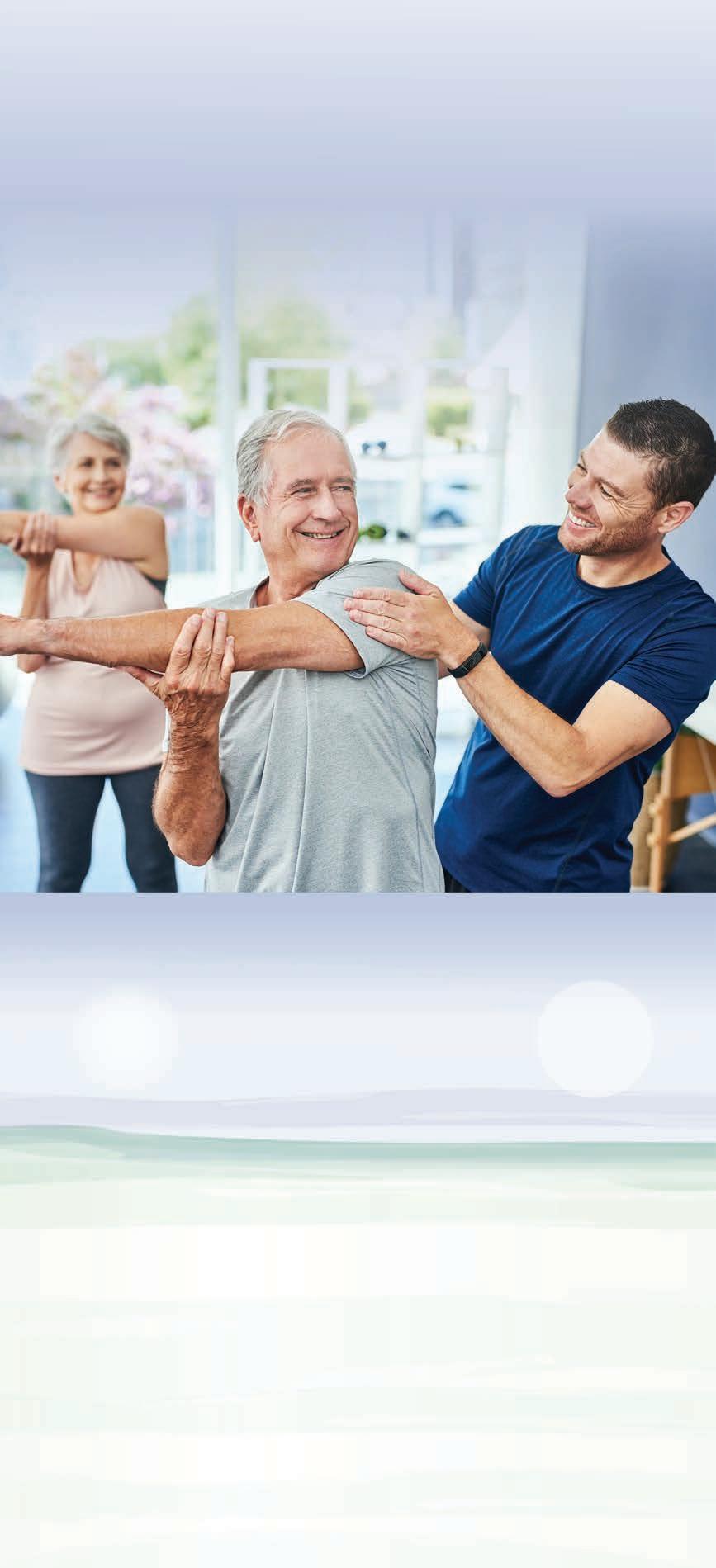

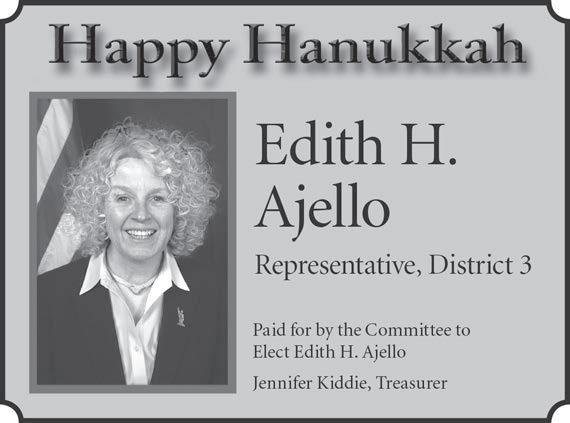




























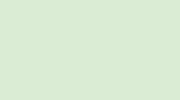









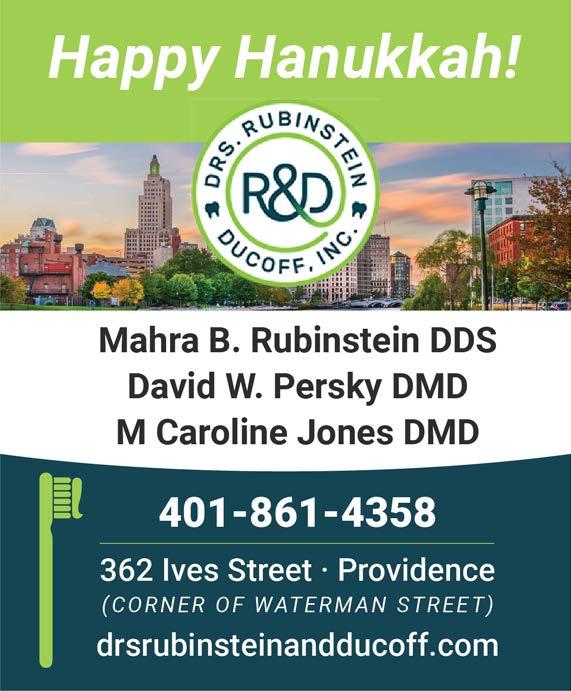
Hanukkah songs. Since 2005, the Beats have been singing in all styles and formats, including Israeli and American pop/rock, old country Yiddish melodies, show tunes and arrangements of modern Hebrew liturgical songs. Free. No RSVP required. Information, office@ templehabonim.org or 401-2456536.
Latkes and Laughter: Temple Habonim Sisterhood’s Annual Hanukkah Family Celebration. Noon. 165 New Meadow Road, Barrington. Early candle lighting and a delicious catered lunch complete with latkes, chicken, vegetarian options, chicken tenders for children and more. Cost: $18/ adult | $12/child. Information and registration link (indicate if vegetarian), Adina at office@ templehabonim.org.
Monday | December 16
Young Professionals Hanukkah Happy Hour. 4-8 p.m. Moniker Brewery, 432 W Fountain St., Providence. Latkes will be available, and the price of a ticket includes one drink. Come celebrate the Festival of Lights with fellow young professionals. Cost: $10. Information and RSVP, Samantha Kaufman at skaufman@ jewishallianceri.org or 401-4214111, ext. 111.
Tuesday | December 17
Emanu-El’s Got Talent + Hanukkah Bazaar. 6:30 p.m. 99 Taft Ave., Providence. Everyone welcome. Information, Shosh Jacob at shosh@teprov.org or 401-3311616.
Thursday | December 19
Temple Sinai MaccaBingo. 7-9 p.m. 30 Hagen Ave., Cranston. Lively evening of bingo. Cost: $5 per card per game or $72 for two cards for all 10 games. Information, Templesinairi.org, dottie@ templesinairi.org or 401-942-8350.
Friday | December 20
Kosher Senior Café Hanukkah Party. 11 a.m.-1 pm. Dwares JCC, 401 Elmgrove Ave., Providence. Live music from Stanley Freedman and Friends followed by a holiday meal. Suggested donation: $3. The Kosher Senior Café is a program of Jewish Collaborative Services and is supported by the Jewish Alliance of Greater RI and Blackstone Health. RSVP (by 12/13/24) and information, Neal at neal@jfsri.org or 401-421-4111, ext. 107.
National Havurah Winter Weekend Retreat. Friday 4 p.m. – Sunday 2 p.m. Camp Ramah, 39 Bennett St., Palmer, Mass. Amazing sessions, people, activities and a
spiritual forest/lake environment. Supervised program for children. Reduced fees for 20s and students. Winterized accommodations. Kosher meals with vegetarian options. Cost: $280. Information, Steven Lewis at stevenl@rcn.com or 617-714-4993.
Temple Sinai Shabbat Service. 6-7 p.m. 30 Hagen Ave., Cranston. Service will be held in the Chapel. Information, Templesinairi.org, dottie@templesinairi.org or 401942-8350.
Temple Beth-El Shabbat Hallelu Service. 6:30 p.m. 70 Orchard Ave., Providence. Pre-neg and musical Shabbat service. Information, Jillian Brosofsky at jbrosofsky@temple-beth-el.org or 401-331-6070, ext. 100.
Saturday | December 21
Temple Beth-El Shabbat Service. 9 a.m. 70 Orchard Ave., Providence. Monthly Shabbat morning service. Information, Jillian Brosofsky at jbrosofsky@templebeth-el.org or 401-331-6070, ext. 100.
Temple Torat Yisrael Virtual and In-Person Morning Shabbat Services. 9:30-10:30 a.m. 1251 Middle Road, East Greenwich. In person with Zoom available. Information, temple@toratyisrael. org.
Temple Sinai Breakfast and Torah Study. 9:30-11 a.m. 30 Hagen Ave., Cranston. Breakfast followed by Torah study at 10 a.m. Information, Templesinairi.org, dottie@ templesinairi.org or 401-942-8350.
Temple Sinai Shabbat Morning Service. 11 a.m.-noon. 30 Hagen Ave., Cranston. Service will be held in the Chapel. Information, Templesinairi.org, dottie@ templesinairi.org or 401-942-8350.
Wednesday | December 25
Hanukkah at Shalom Apartments. 5:30 p.m. 1 Shalom Drive, Warwick. Hot latkes, gelt and the dreidel game. Information, Rabbi Yossi Laufer at rabbiwarwick@gmail.com or 401-447-8424.
Thursday | December 26
RI Chapter Hadassah Hanukkah Party. 11 a.m. Private home, Pawtucket. Join us in person or via Zoom for the lighting of the 2nd Hanukkah candle. Bring your own menorah (hanukkiah), a dairy dish to share and lots of spirit. Festivities will include candle making, singalong and inspiring words live from Israel. Information and RSVP (by 12/20/24), ChapRI@Hadassah.org.
Hanukkah Spectaculah. 4:45-6 p.m. Providence City Hall, 25
Dorrance St., Providence. Menorah lighting outside Providence City Hall followed by food, music and art inside City Hall (2nd floor) 5-6 p.m. Sponsored by the City of Providence, the Providence Department of Art, Culture + Tourism, and the Jewish Alliance of Greater Rhode Island.
Hanukkah at Pawtuxet Park. 7 p.m. 2 E View St. (just off Narragansett Parkway), Warwick. Light the menorah, enjoy hot latkes and gelt, and play the dreidel game. Information, Rabbi Yossi Laufer at rabbiwarwick@gmail.com or 401447-8424.
Friday | December 27
Temple Beth-El Kabbalat Shabbat Service. 5:45 p.m. 70 Orchard Ave., Providence. Early Kabbalat Shabbat. Information, Jillian Brosofsky at jbrosofsky@templebeth-el.org or 401-331-6070, ext. 100.
Temple Sinai Shabbat Service. 6-7 p.m. 30 Hagen Ave., Cranston. Service will be held in the Sanctuary. Information, Templesinairi.org, dottie@ templesinairi.org or 401-942-8350.
Saturday | December 28
Temple Beth-El Torah Study. 9 a.m. 70 Orchard Ave., Providence. In-person Torah study. Information, Jillian Brosofsky at jbrosofsky@ temple-beth-el.org or 401-3316070, ext. 100.
Temple Sinai Breakfast and Torah Study. 9:30-11 a.m. 30 Hagen Ave., Cranston. Special breakfast for Hanukkah followed by Torah study at 10 a.m. Information, Templesinairi.org, dottie@ templesinairi.org or 401-942-8350.
Temple Sinai Shabbat Morning Service. 11 a.m.-noon. 30 Hagen Ave., Cranston. Service will be held in the Chapel. Information, Templesinairi.org, dottie@ templesinairi.org or 401-942-8350.
Menorah Lighting at East Greenwich Town Hall Front Lawn. 6 p.m. 125 Main St., East Greenwich. Light the menorah, sing Hanukkah songs, enjoy hot latkes and gelt, and hear greetings from dignitaries. Information, Rabbi Yossi Laufer at rabbiwarwick@gmail.com or 401-447-8424.
Sunday | December 29
Temple Sinai People of the Book. 2-4 p.m. 30 Hagen Ave., Cranston. Join us for a lively discussion about “The Yiddish Policemen’s Union” by Michael Charon. Information, Templesinairi.org, dottie@ templesinairi.org or 401-942-8350.
Menorah Lighting at Warwick Mall. 4:30 p.m. 400 Bald Hill Road, Warwick. Join us near JCPenney to light the menorah, sing Hanukkah songs, enjoy hot latkes and donuts, and shop for gifts. There will be arts and crafts activities for children. Information, Rabbi Yossi Laufer at rabbiwarwick@gmail.com or 401-447-8424.
Monday | December 30
Menorah Lighting Ceremony. 6 p.m. RI State House, 82 Smith St., Providence. Greetings from dignitaries, hot latkes, gelt and more. Information, believeinprovidence@gmail.com.
Tuesday | December 31
Menorah Lighting Ceremony. 4:30 p.m. Cranston City Hall Lobby, 869 Park Ave., Cranston. Greetings from dignitaries, hot latkes, gelt and more. Information, Rabbi Yossi Laufer at rabbiwarwick@gmail.com or 401-447-8424.
Friday | January 3
Temple Beth-El Kabbalat Shabbat Service. 5:45 p.m. 70 Orchard Ave., Providence. Early Shabbat Service. Information, Jillian Brosofsky at jbrosofsky@templebeth-el.org or 401-331-6070, ext. 100.
Temple Sinai Shabbat Service. 6-7 p.m. 30 Hagen Ave., Cranston. Service will be held in the Chapel.
Information, Templesinairi.org, dottie@templesinairi.org or 401942-8350.
Saturday | January 4
Temple Beth-El Torah Study. 9 a.m. 70 Orchard Ave., Providence. In-person Torah study. Information, Jillian Brosofsky at jbrosofsky@ temple-beth-el.org or 401-3316070, ext. 100.
Temple Sinai Breakfast and Torah Study. 9:30-11 a.m. 30 Hagen Ave., Cranston. Breakfast followed by Torah study at 10 a.m. Information, Templesinairi.org, dottie@ templesinairi.org or 401-942-8350.
Temple Sinai Shabbat Morning Service. 11 a.m.-noon. 30 Hagen Ave., Cranston. Shabbat morning service. Information, Templesinairi. org, dottie@templesinairi.org or 401-942-8350.
Wednesday | January 8
Israeli Culture Series Presents “Shakshuka and Darbuka.” 6:30 p.m. Dwares JCC, 401 Elmgrove Ave., Providence. Join us for a night filled with cooking and music. Shakshuka: A delicious dish of poached eggs in a rich, spiced tomato sauce. Darbuka: A traditional Middle Eastern drum. Under the guidance of Chris Southiere, you’ll learn to play and feel the magic of the music. Free. Information, Gaya Dahan at gdahan@jewishalllianceri.org.
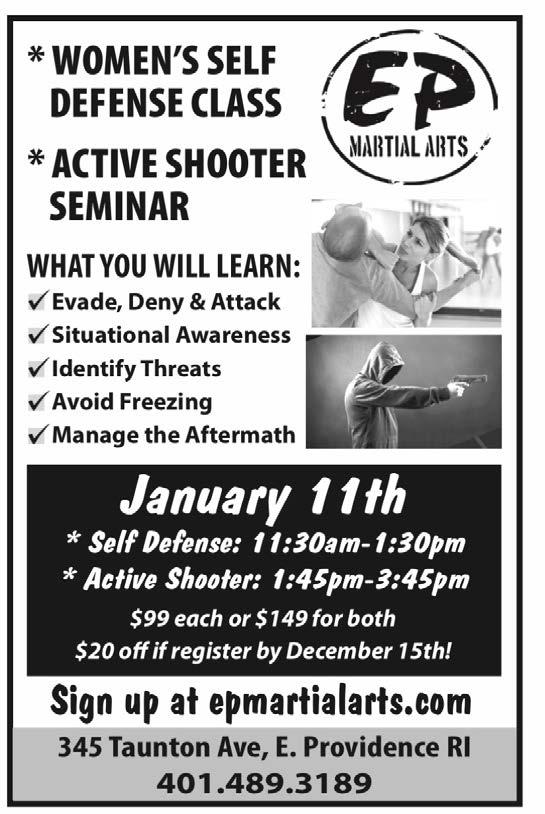
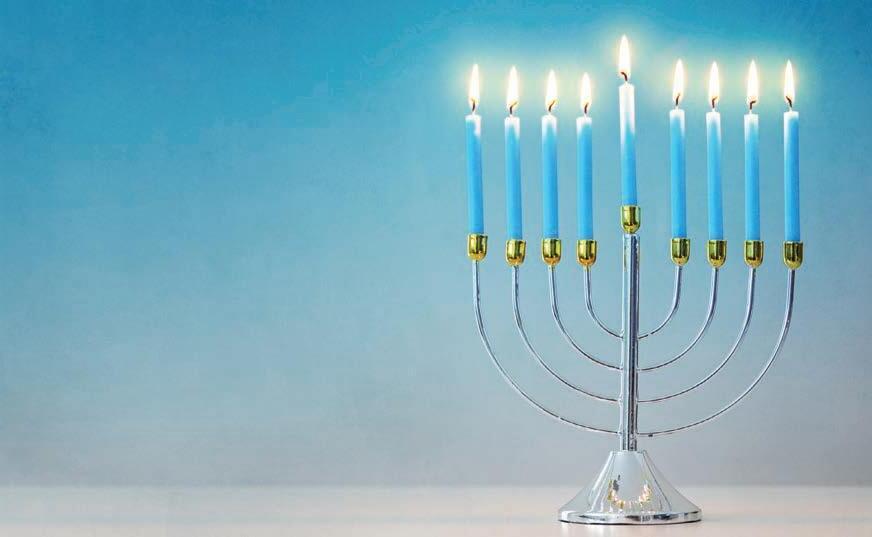

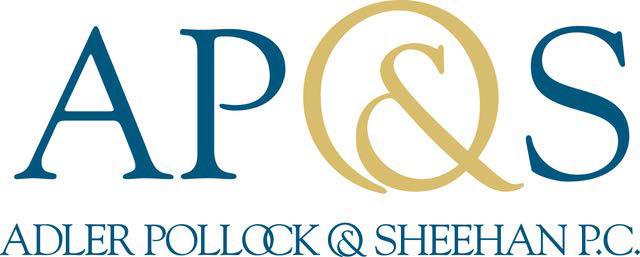
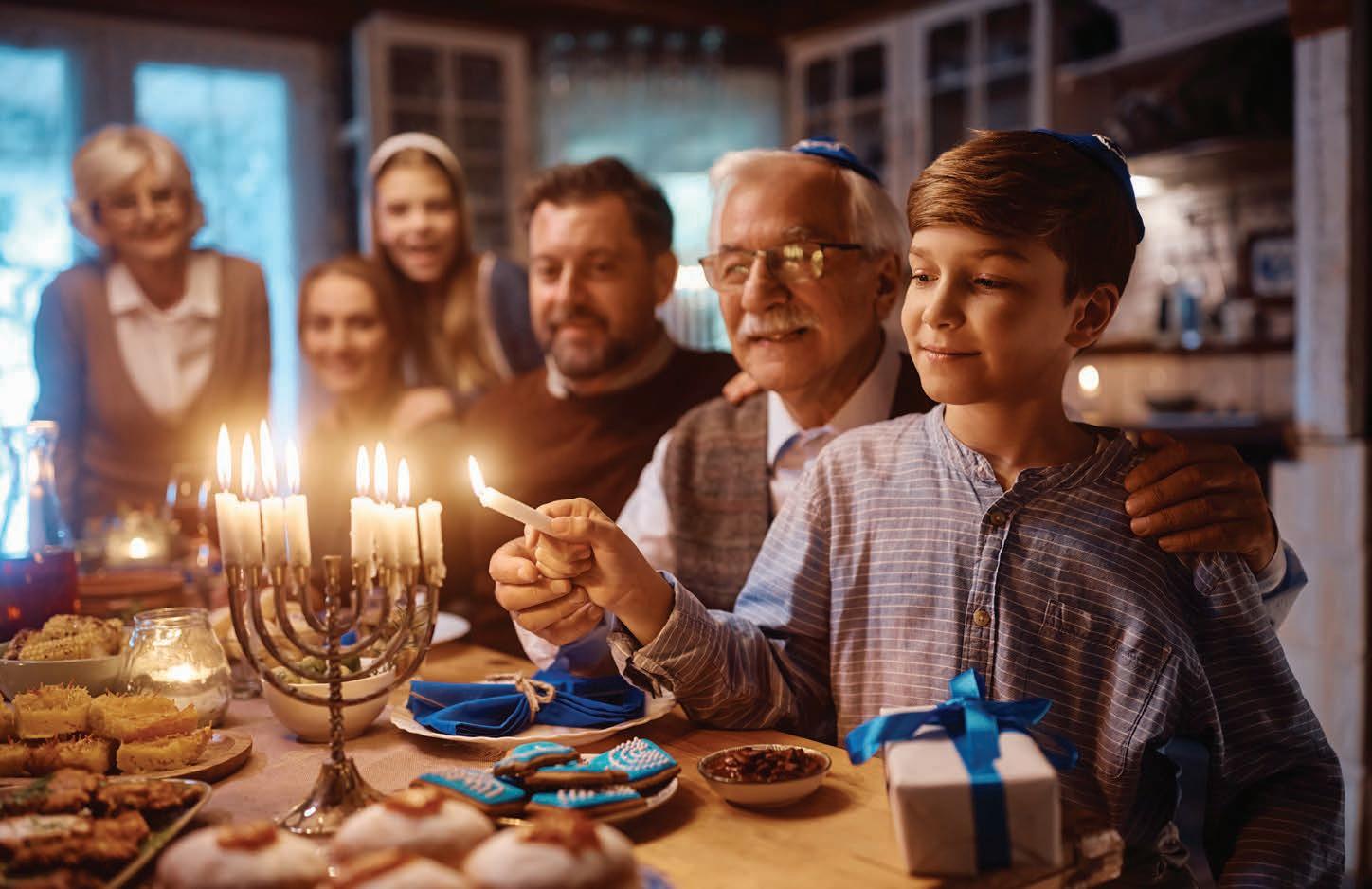
BY GEORGE M. GOODWIN
It’s that time of year again. For the past 20 years, as editor of Rhode Island Jewish Historical Notes, I have written obituaries for each issue – a total of 339. The forthcoming 2024 issue will have about a dozen, and these will honor members of the Rhode Island Jewish Historical Association who have passed away since November 2023.
PERHAPS SOME EDITORS or journalists consider writing obits a grim or a punishing task. I consider it an honor, a privilege and a challenge. Also, to the extent of my abilities, a sacred rite of passage.
Rather than initiating the custom of publishing members’ “necrologies” (as they were originally called), I have merely helped to perpetuate it.

Created in 1954, Rhode Island Jewish Historical Notes has become North America’s longest-running journal published by a state or local Jewish historical association. During my tenure, however, the obituary section has been renamed “In Memoria.”
Obituaries exist to honor our former members and leaders, but also to assist their descendants and future researchers who have grown up (or will grow up) far beyond Little Rhody. These relatives, genealogists and historians can perhaps glean some basic information and insights to clarify a person’s life or propel research by others.
Typically, I have known only a fraction of the Jewish Historical Association’s deceased members. But over many decades, I have known many of the most active members quite well.
For better or worse, my obituaries are based primarily on what has been published in local newspapers, including the one you are now reading. Additional information may also be found on the websites of funeral homes. I usually don’t interview a deceased person’s relatives.
To avoid showing any
preferences, I try to place obituaries within a standard format, emphasizing basic biographical information and contributions to Jewish communal life. My obituaries tend to be concise, but it does seem appropriate to give major Jewish leaders more attention than to those who have made more modest communal contributions.
Nevertheless, I also tend to downplay expressions of personal sentiment. I believe that an understated tone is appropriate.
It is also worth noting, however, that published obituaries can often be quite subjective. A deceased person’s strengths can be easily exaggerated and his or her shortcomings overlooked. I dare say that a person’s life can be so radically reinterpreted by some relatives that it runs the risk of becoming almost unrecognizable.
Fortunately, however, I have never attempted to impose my observations or feelings on a family’s loved ones. I aspire to make the editorial process so objective that it should have nothing to do with me.
I feel quite honored when I can pay my respects to a deceased friend or colleague by including a forgotten or overlooked detail. I also greatly enjoy the possibility of including a dash of humor about something that may not have been widely known. Yes, it seems to me that writing and reading obituaries is not meant to be an entirely solemn ritual. Rather, obituaries often work best when they capture moments that help make our
lives feel even more precious even though they are transitory.
Thus, occasionally, a wonderful obituary can have relatively little to do with the predictable cadence of a person’s family, educational, professional, military or communal accomplishments. How did that person reflect or evoke happiness? How and where did he or she surprise or shine?
I once asked one of my favorite rabbis if I should do some obituary homework by inviting elderly people to submit some of their own ideas. He answered, essentially, “Are you cracked?” He knew that such a process could lead to all kind of confusion and misunderstanding. Additionally, perhaps, a good obituary did not necessarily require too much deliberation. Based on a factual foundation, it could be more naturally or spontaneously conceived. Without saying so, my dear friend also suggested that, at its best, an excellent obituary can glow as an artistic expression – a genre of its own. That is, when creative and spiritual messages converge, they give resonance and depth to each other.
Many of my personal files, still kept in heavy, metal cabinets, overflow with all kinds of precious, useful and esoteric information. I have clipped and saved a large number of obituaries about notable artists, architects and other luminaries, for example. I somehow imagine that one day I will need to gather some forgotten facts, or another writer will help me recognize a trait or an impression that has eluded me.
For many years, if not decades, I have also filled reservoirs of information. For example, I have conducted hundreds of hours of tape-recorded interviews for libraries and archives, and a large number of these conversations have been transcribed, edited and bound for future reference. Many of these interviews, conducted at weekly intervals, have run to several hundred
typewritten pages. Perhaps in some sense these conversations also became therapy sessions – for interviewees and interviewer alike. Quite seldom did we discuss death, however. It was assumed, but our primary mission was to celebrate life.
Despite decades of preparation, I consider myself fortunate to have written some eulogies that I have delivered at my own loved ones’ funerals. Hoping that these heartfelt remarks will always have some meaning for me and perhaps a few others, I have saved these too.
So what about my own obituary or eulogy? Fearing that somebody who does not know me well may write for the “Notes” or officiate at my funeral, I have tried to provide some guidance. I’ve written 15 pages that can
be slightly (or significantly) edited. Indeed, a eulogy lasting five or 10 minutes should be long enough.
Far from ends in themselves, obituaries are ultimately sketches or shadows. They attempt to highlight a deceased person’s gifts, successes and accomplishments. Yes, mostly, beauty, goodness, generosity and love –but also possibly some disappointments, frustrations and failures – that have made us survivors feel deeper and stronger. Eventually, we endure through memories and stories that others feel privileged to write or tell.
GEORGE M. GOODWIN , of Providence, is the editor of Rhode Island Jewish Historical Notes.

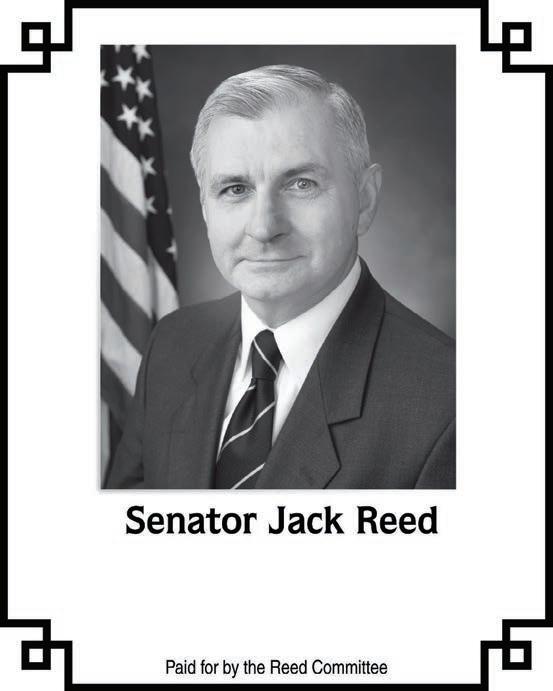

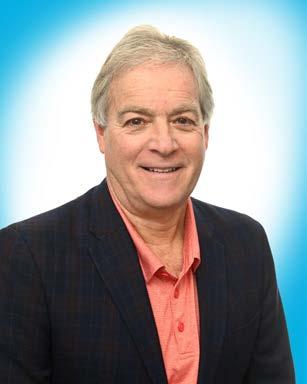
THIS YEAR OUR lunisolar calendar places the start of Hanukhah on Christmas Day. As Rabbi Mark Wildes of New York told The Jerusalem Post: “The Jewish calendar carries the spiritual weight, with spiritual landmarks along the way. The Gregorian calendar carries more of a Christian or Roman tradition, and so for Jews it simply does not contain the same spiritual significance.” However, both holy days celebrate the return of light after a time of darkness. Hanukkah is also a holiday in which we, like the ancient Jews sanctifying the temple, rededicate ourselves to living by our values.
pal Zach was a latter day Noah, but eventually he burnt his Ark though he did not abandon at least one of his feathered friends.
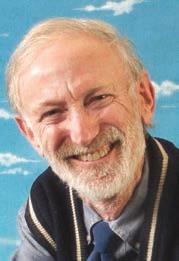
Indeed, Zach believes that the crow may have played a major role in the formation of our human species. Professor John Marzluff of the University of Washington has long been fascinated by the amazing feats of crows and ravens and has wondered about the ways in which they have adapted and evolved in their ongoing cohabitation with humans. (https://www.washington. edu/alumni/partnerships/ cfr/201104/crows.html)
With Israel in tsuris, we are struggling this December to find the true focus of Hanukkah both publicly and privately. I was born in December, and my symbol on ancient mythologies is Sagittarius, a centaur aiming an arrow. He represents a learned healer whose higher intelligence forms a bridge between Earth and Heaven. Sagittarius is said never to fail in hitting the mark and this alludes to the power of prophecy for those born under this sign. Like the motto of our ocean state, in these dark days leading up to our festival of light, I would like to prophesy the promise of “Hope” ahead. I have a friend who became a local celebrity. You may recall (if you still subscribe to the Providence. Journal) the man who tamed, or rather befriended, a crow, a raven, and a jaybird, and then built an Ark so they could share their lives together. Their handbuilt homestead, which avoided taxes, attracted quite a crowd of visitors as it welcomed long lines of them on both sides of the Seekonk River. Perhaps my

It seems that the term “bird-brain” is all wrong, and we may have learned because we were guided by the feathered creatures with the outsized brains. Zach came from a farm background and closely observed the intelligence of wildlife as indeed did Professor Marzluff.
My theme for this month of dark days is for us to focus on our menorahs for eight days, since they pledge allegiance to the belief that there is indeed a divine design. We hope that light will return and Israel, the lantern unto the nations, will succeed and shine. For this kind of faith I thank Zachary who believes, as I do, that every living soul has its role to play and its spiritual meaning for us to study. We must respect and regard the rights of all souls to share our planet, before it is too late!
It was a bonus to discover that Zachary is indeed Jewish....on his mother’s side. So, to sum up, L’Chaim!!
MIKE FINK (mfink33@aol. com) is a professor emeritus at the Rhode Island School of Design.
Elissa Felder, of Providence, started and actively manages the only international community of practice for women engaged with traditional chevra kadisha (burial society). The community mission is to share experiences, give encouragement, network, learn together and help to develop and support each other. She is responsible for building the community and providing on-going professional development.
AFTER THE DEATH of her first child, Sam, Felder began her quest to understand where her baby had gone. She explored what the Jewish tradition had to say about death and the afterlife. She was anxious to find comfort from her faith.
In response to understanding more about the traditional Jewish way of caring for the dead, she became involved in that work herself and has been very active in her local chevra kadisha (burial society).
go back to a previous preloss way of being. However, we can learn to live with grief and learn to carry the holes in our heart that loss brings.”
On what it means to heal:

Felder speaks widely on the topics of grief and loss and is committed to spreading greater awareness of the holy and loving Jewish customs surrounding death and burial.
Felder is the founding director of Core Connects RI, a nonprofit organization in Rhode Island that aims to deepen women’s connections to one another, to Jewish wisdom and Jewish values, to empower each other to find greater meaning, purpose and possibility in life and to cultivate unity without uniformity.
In a recent interview, Felder discussed her new book “From One Life to the Next Life; The Sacred Passage After Death,” which was published in September by Mosaica Press. https:// mosaicapress.com/product/ from-one-life-to-the-nextlife/ It is also available on Amazon and at local bookstores.
On what grief is:
“Grief is like a snowflake, since no two snowflakes are alike. It is multi-layered. We don’t ever recover and
“I think people sometimes ask, Am I ever going to be normal? Am I ever going to be the way I was before Sam died? No, we’re not going to be the same, but can we use our experiences to become different people, hopefully better people, more compassionate people. We can continue to live fully.”
On dealing with the pain of loss:
“We live in a society that unlike Judaism seeks to avoid pain. The Jewish tradition teaches that the pain that we endure and are challenged by are orchestrated by God to help us grow. The pains and struggles of life are not meaningless and are not random. They are part of the process of our soul’s journey.”
On what comforted her on the loss of her son:
“One thing that comforted me was an understanding that death is not the end of our journey. Jewish wisdom teaches that life is a miraculous coupling of a holy God-given spiritual soul with a physical, organic body. Death is the beginning of the separation of the soul from its body. Our soul, the shining bright light that God constantly breathes into us, continues its journey in the next world. Death is a transition to another life beyond this one. That
to me was very comforting. Understanding that Sam didn’t stop being, that he didn’t end, that he moved on was very comforting.”
On what Judaism teaches about what happens when we die: “When we die the soul separates from its body. This uncoupling of the two aspects of who we are happens in stages. The chevra kadisha cares for both the body and the disembodied soul. We are able, with Divine assistance, to bring about a purification and a cleansing of both aspects of who we are. We wash and pour water on the deceased to help release the soul into the spiritual world.”
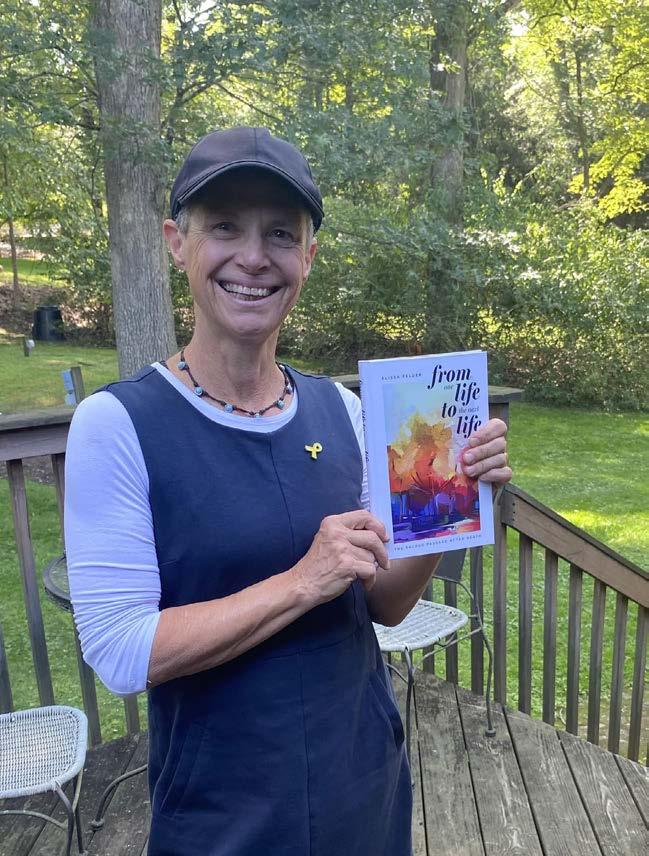
On Elissa’s mission with chevra kadisha:
“My service on the chevra kadisha has become a very important aspect of who I am. Every time we enter the morgue to prepare our fellow Jew for burial, we are starkly confronted with our own mortality. This jars us into appreciating the gift of life we still have and ‘wakes us up’ to try to live our lives meaningfully and well. When faced with death on a regular basis, you are so aware of the fleeting nature of life and the need to seize every moment of life that we get to still enjoy.”
What Judaism teaches about mourning:
“Our tradition teaches
that one shouldn’t mourn excessively. Perhaps, this means that those who are alive must continue to keep living. When Sam died, I felt that my life was over. But I didn’t die, Sam did. Our lives matter because each one of us has something only we can do. All of us who are alive have a purpose and work to do to rectify the world in our own unique way.”
On the importance of giving and receiving:
“Sometimes it’s hard to receive because we feel that it is a sign of weakness. I see accepting help as something very courageous because we are acknowledging that we can’t do everything on our own. We need others. We need help.”
“After Sam died, I was very aware of the importance of all the things people did to help us. I had a
friend who brought me a cup of coffee a week after Shiva had ended. That small act was so big for me. I understood that when your heart is cracked open even small gestures can bring great comfort and healing.”
Closing thoughts:
“Within our Jewish tradition, there is a wealth of wisdom that can bring great comfort to our lives, our losses, our pain and our suffering. Don’t stop learning.”
PATRICIA RASKIN , owner of Raskin Resources Productions, is an awardwinning radio producer, business owner and leader. She has served on the board of directors of Temple Emanu-El, in Providence. Her “Positive Living with Patricia Raskin” podcast can be heard on voiceamerica. com
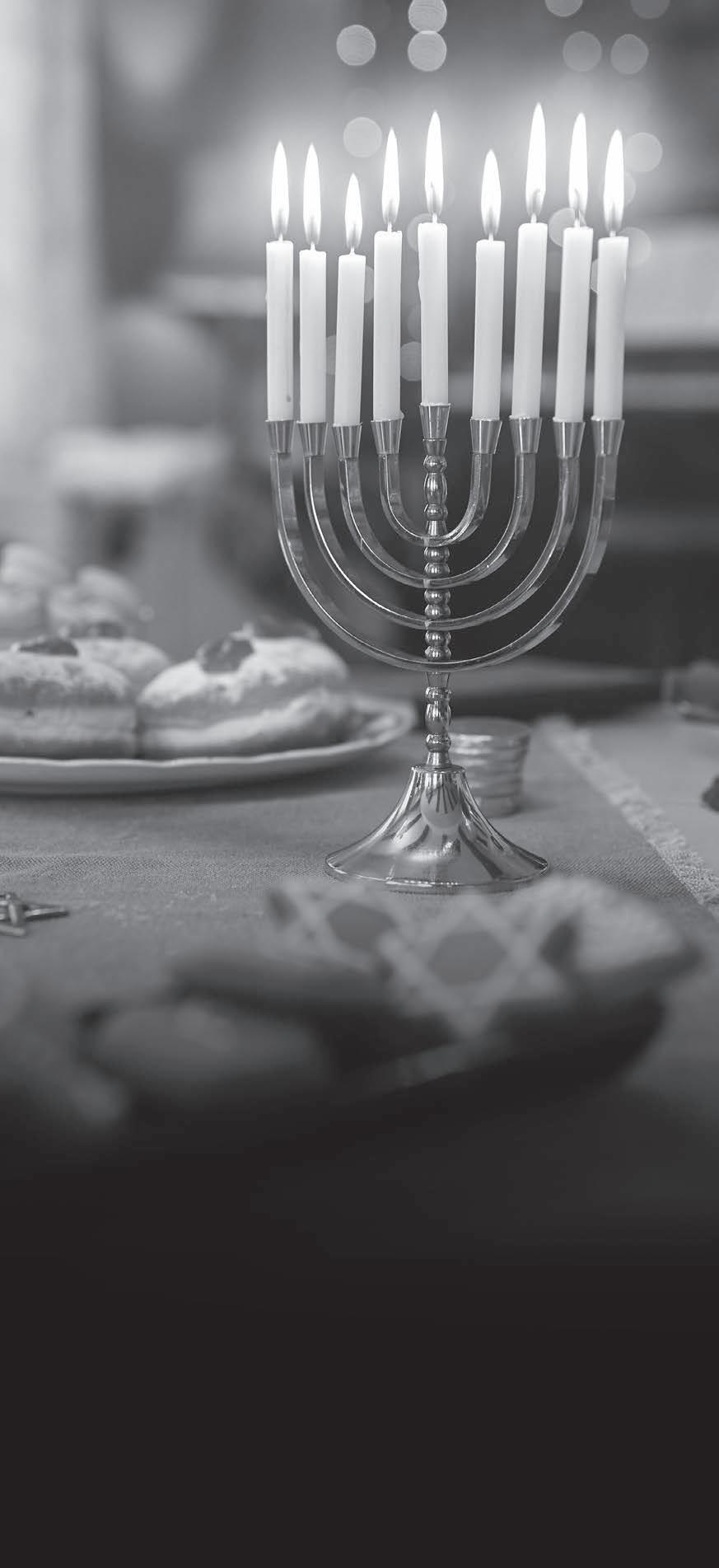
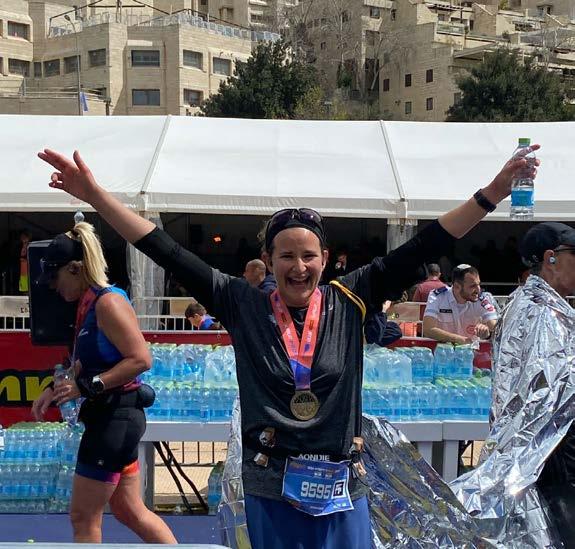
Ifirst met Tzipporah Witty (“Witty” as she’s commonly known), several years ago when she was looking for a Shabbat meal. I hosted her after a mutual friend put us in touch. We’ve been friends ever since.
THE SECOND of seven children, born in New Jersey, she and her family eventually ended up in Canada when she was 12. She left high school early since she qualified for the early admissions program at Yeshiva University – Stern College for Women. She spent one year there studying computer science before going to seminary at Kibbutz Migdal Oz. After one and a half years there, she continued (and completed) her Computer Science studies at Bar Ilan University. Around this time, she officially made aliyah (became an Israeli citizen). She started as a software developer and has worked at several companies throughout the years.
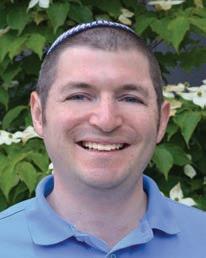
Witty's interests are varied. She has juggled full-time jobs with other activities, including, but not limited to, being a volunteer police officer and studying Jiu Jitsu and Judo at the same time. She has run six marathons, and, around 2021, she added triathlons (swimming, biking and running). Since then, she has completed four half iron (wo) man triathlons. It’s worth mentioning that she wore the special athletic skirts that reflect the dress style of many observant Jewish women while undertaking these feats.
Starting after the horrific day of Oct. 7, 2023, the
CONTINUED FROM PAGE 14
army utilized a pre-existing program that allowed those who had previously not served and were considered past the normal age-range for enlistment (i.e. generally ranging from a minimum of 18-years-old to on average no older than early/mid-20s), to enlist.
Many joined at the beginning of the war. While the program originally targeted men, Witty was among the first group of women to enlist as part of a pilot program. She joined in early 2024 when she was 32-years-old, and she is now 33.
Reasons that these people, both the men and women, had previously never served in the IDF vary. Some did not join because it is not obligatory for some Haredi and/or other types of observant men and women. Some were considered too old by the time they made aliyah. Others did some other form of (non-military) national service. While the men who were drafted were assigned duties either related to their professions or the army’s needs at the time, women such as Witty were picked for this draft by profession; mostly healthcare, social work or technology. For Witty, it was the latter.
Among the women with whom Witty was drafted, the age range was approximately 25-48. At least 10-20% of the women were mothers who video called their kids during their basic training.
Like the others, Witty spent three weeks in basic (non-combat) training. Just as she did with her triathlon training, Witty did her basic military training (and now her current service) in a military uniform that has a skirt instead of pants.
As an incentive to help encourage people to put their jobs on hold and join (or continue) reserve duty in the IDF during this time, soldiers such as Witty receive the same salary as they did in their last three months of civilian employment. According to Israeli law, no one can lose their job due to military/ reserve duty service. Witty’s civilian company has been very supportive and encouraging. They put this into practice by sending her gifts and making sure she knows that they miss her but support her.
Following her basic training, Witty was assigned to a unit working on PR software. After a few months, she was recruited to a team that was formed to work on new software for logistics teams supporting intelligence and other non-combat teams. She is currently the head of the development team on this project. At the time of writing this article, the first version of the software is due to be deployed in late November.
Despite her army service, Witty has not slowed down
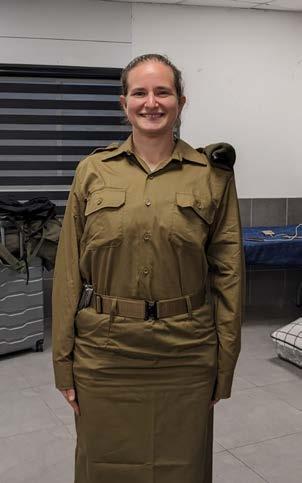
one bit. She gets to her base early in order to get in a run. With special permission, she has continued her volunteer police officer service on some weekends. And she still goes to Judo practice.
There are a lot of things to admire about a person like Witty. She never makes excuses not to find places for all the things she wants as part of her life, such as her fitness activities. Not even the army has stopped her. She is one of an ever-growing number of Israelis who are going above and beyond all expectations, and who have put their normal lives on hold to serve Israel and help the Jewish people as best they can.
DANIEL STIEGLITZ (dstieglitz@gmail.com), originally from Rhode Island, immigrated to Israel in 2007 and currently lives in Jerusalem. His collection of short stories, “Tavern of the Mind,” is available for paperback and Kindle purchase on Amazon. www. amzn.to/2Izssrz.







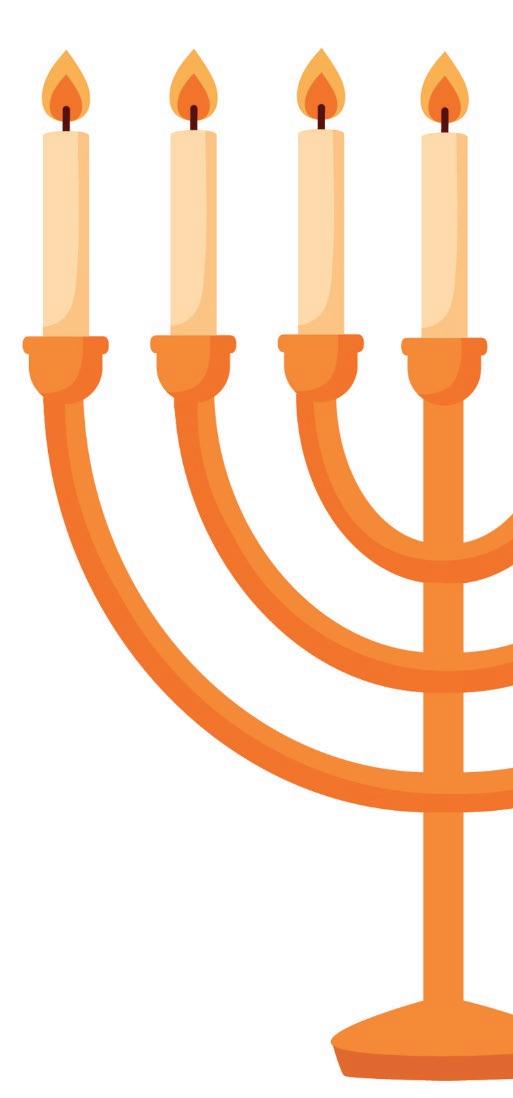

RECENTLY, teachers and authors who are participating at the 2024 NCTE (National Council for Teachers of English) convention in Boston issued a petition to prevent CAMERA (Committee for Accuracy in Middle East Reporting in America) from having a presence there. CAMERA is portrayed as a right-wing hate group, when what they actually do is call upon the media to issue corrections when the facts are misrepresented and post articles on the subject.
The petition can be found here: https://shorturl.at/BtKWq
During the current rise in antisemitism, censoring alternative viewpoints and only allowing pro-Palestinian narratives is much more like indoctrination than it is education.
David Middlemiss
Cranston, R.I.
Editor’s note: Information on CAMERA can be found at camera.org
BY ASAF ELIA-SHALEV
(JTA) The Schusterman family is in the oil and gas business. Now they are also donors to a group that believes the emissions from burning fossil fuels constitute an existential threat to humankind.
Newly released tax disclosures for 2023 show that the Charles and Lynn Schusterman Family Philanthropies gave a $300,000 grant to Adamah, the largest Jewish environmental organization, whose mission is to “cultivate vibrant Jewish life in deep connection with the earth, catalyzing culture change and systemic change through immersive experiences, Jewish environmental education, leadership development and climate action.”
It’s the first grant ever from the Schusterman family foundation, one of the largest in the country, to a group dedicated to addressing the climate crisis.
The grant makes up a tiny fraction of the $363 million the foundation gave out last year. Still, it is noteworthy because environmentalism is one of the few signature progressive issues where the Schustermans have not left a mark. By giving away hundreds of millions of dollars a year in areas like education, criminal justice, reproductive justice and voting rights, the foundation has helped shape national debates on race, gender and class.
With Adamah, the Schustermans found a way to make an initial foray into environmental philanthropy while also furthering the
CONTINUED ON PAGE 31
Ihave read and reviewed a number of books by Providence author Mark Binder (also known by his pen name Izzy Abrahmson), but his most recent novel, “The Council of Wise Women” (Light Publishing, 2024) fills me with surprise. It is unlike anything I have ever read by Binder.
TO BEGIN WITH, the author’s previous books have, for the most part, been collections of loosely connected family-friendly episodes centering about the comings and goings of the eccentric – but by no means crazy –Yiddish-speaking residents of Binder’s version of Chelm, a nineteenth-century shtetl somewhere in the “Old Country” of Eastern Europe. These books often center about such holidays as Hanukkah and Passover that are widely observed in some fashion or other by us American Jews.
Chelm’s Council of Wise Women are gathered in their cave to discuss a community crisis: “What do we want to do? The men of Chelm are useless.”
Further on: a woman complains about her husband, a tailor: “But for him, I am nothing but a cook and laundress, a cleaner and a shopper. I am a tool that he uses, like he uses his scissors.”
Binder’s novel overflows with well-drawn complex characters, but at the center of the story is Rachel, whom we follow from her birth through her early teenage years. She is far more than precocious; she is a child genius. By the age of 7, she has taught herself to read not only Yiddish and Hebrew but also German and English. When she was only 12 years old, she wrote a learned scientific paper which was accepted for publication by a prestigious Viennese journal.
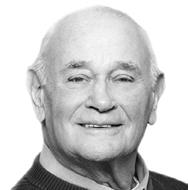
But Rachel’s genius proved in some ways to be threatening to the shetl’s patriarchy; because of her obvious intellectual brilliance, she wound up at the age of 9 to be the first girl, but not the last, to enter Chelm’s all-boys yeshivah
By way of contrast, “The Council of Wise Women” is a continuous narrative of about 300 pages, divided into 11 sections, given such titles as “The Old Woman,” “The Girl,” or “The Council Resumes.” These sections are divided into 48 chapters, each one compelling the reader to turn page after page to find out what happens next.
‘In his newest work, Binder plunges into the lives of real, non-idealized families.’
The very title of Binder’s latest novel suggests that the author would highlight certain feminist themes. The book is filled with women’s complaints about men. Early on: “Babies are like men; they are immature and selfish. They always want service.”
Or midway through the book:
(echoes of Yentl). As she tells her mother, “For hundreds, if not thousands of years, men have assumed that knowledge was their domain. It’s not fair, and it’s not true. Women can be just as wise as men, if not wiser.”
Through her great gift for languages, her sheer persistence, and her desire to bring aid and comfort to her twin brother on his bar mitzvah day, Rachel memorized Yakov’s Torah potion and wound up mouthing it for him from her position
in the woman’s section on the balcony of Chelm’s synagogue. The rabbi was so moved when he discovered how Rachel had helped her brother that he told her, “You have performed a mitzvah today, a bat mitzvah.” Rachel Cohen. Pioneer of Jewish feminism.
From the opening pages of Binder’s novel, the reader realizes that this will not be the heart-warming story of “heimish” Jewish family life so often depicted as the norm in the Eastern European Jewish shtetl. The Cohen family – Benjamin, Sarah, and their twin children, Rachel and Yakov – will not turn out to be a happy one, even less happy than the bitter-sweet shtetl family depicted in Fiddler.”
In his newest work, Binder plunges into the lives of real, non-idealized families. He casts a sobering shadow on the Yiddish humor that serves to hide the actual lives of the shtetl families we prefer not to see. Binder gets real about Chelm, real about how over time even the soundest of human relationships are darkened by anger, by hurt, by guilt, by savage twists of miscommunication, At times, Binder ‘s language becomes extremely precise, his well-chosen phases drawn from deeper, richer, perhaps more conflict-torn places. It is almost as if Binder’s words are flowing with such intensity that he seems to be taking direct dictation from his muse.
“The Council of Wise Women” does not end happily ever after, but neither does it end unhappily ever after. The story begins, flows on, and ends in ambiguity: confusing, yet at times hopeful, imperfect as life itself.
Note: To purchase a copy of “The Council of Wise Women,” order from your favorite bookstore, or order online from Amazon, Barnes & Noble, etc. For more information, visit the website: izzyabe.com.
JAMES B. ROSENBERG is a rabbi emeritus at Temple Habonim in Barrington. Contact him at rabbiemeritus@templehabonim. org.
Jewish Rhode Island publishes thoughtful and informative contributors’ columns (op-eds of 500 – 800 words) and letters to the editor (300 words, maximum) on issues of interest to our Jewish community. At our discretion, we may edit pieces for publication or refuse publication. Letters and columns, whether from our regular contributors or from guest columnists, represent the views of the authors; they do not represent the views of Jewish Rhode Island or the Alliance.
BY SAMUEL DUNSIGER
This story originally appeared on Hey Alma.
For the last few years, as soon as my fiancée and I busted out our menorah and lit the candles for the first night of Hanukkah, I would snap a quick picture on my phone and text it to my mother –and she knew the reason why.
OF COURSE , Hanukkah is a time to celebrate the freedom from oppression and the miracles associated with the holiday. But, for me, interwoven in the themes of oppression and miracles is another reason to celebrate: Disability.
I’ve had a speech disability since I was 3 years old. To be precise, my speech disability manifests as stuttering – or rather, the involuntary disruption of words through prolongations, repetitions and pauses. But somehow, you would barely notice my stutter as I utter the Hanukkah blessings while lighting the candles, since people tend not to stutter when they sing.
It’s kind of ironic that my speech disability doesn’t quite surface during Hanukkah, yet the Festival of Lights serves as a time to reflect on my relationship with disability.
My views on Hanukkah weren’t always like this. As a kid, whenever my mom would take out our menorah from the dining room cup -
board, after wiping away the dust that had accumulated over the course of the last 12 months, my mind focused on one thing and one thing only – and it sure wasn’t my disability.
“Time for presents!”
It was understandable. What kid doesn’t get excited about gifts? I was 8 years old, and my parents had a tendency to spoil me and my brother with a gift – usually, for me, the latest action figure – for each night that we lit the candles. It was a hell of a time for us.
But as we got older, our parents felt less inclined to spoil us with presents – at least, not for 8 consecutive days. We still lit the candles, enjoyed my mom’s homemade latkes and exchanged chocolate gelt. But we didn’t make as much of a spectacle about it with elaborate gifts. Rather, we focused on enjoying our time together.
Eventually, I moved out from my parents’ abode and found my own way. Now I live with my fiancée, with whom I developed our own
Hanukkah traditions of candle-lighting (and then texting the usual picture to my mom), latke-indulging and unabashedly bellowing the blessing to the amusement of my significant other.
Concurrently, my perceptions of my disability started to change as well. I used to shy away from the fact that I stutter, a feat made possible by avoiding many social situations. But, over time, I started to accept my disability and open up about it. Eventually, I welcomed my speech disability as an appreciated part of my identity, as having a stutter gives me a different outlook on life.
But what do my newfound perceptions of disability have to do with Hanukkah?
Well, in the last few years, I started thinking more about what exactly Hanukkah means to me, as opposed to what it means in general or what I was brought up to associate with the holiday.
Let me explain. Growing up, I, like many young Jews, learned about Hanukkah as the celebration of the Maccabee Jews’ prevailing over the oppression of the Syrian Greeks, the last jug of oil found in the Temple and the miracle of the oil lasting the full eight days necessary.
But in recent years, I started to reflect more on the oppressions and miracles not just of the past, but also the oppression we continue to face and the nuanced miracles we see and experience
every day.
Included – and sometimes lost – in this focus on continuous oppressions is disability and the experiences of disabled Jews, and how we navigate issues of inaccessibility and ableism even within the Jewish community.
I don’t generally consider myself a big believer in miracles. However, as I reflect on my disability, I’m inclined to think that there’s perhaps no bigger miracle than my ability to live a fulfilling life in spite of the ableist barriers I often find myself facing.
It wasn’t until pursuing my master’s degree a few years ago that this idea of disability being a miracle entered my mind. I had taken a disability studies course led by Devon Healey, an actor who is visually impaired. During our first class on Zoom, Devon challenged us to take a deep breath, close our eyes and imagine what disability looks like.
Of course, I thought of my stuttering. But then she went a little further.
“What does disability feel like?” she asked.
I had never asked myself that exact question. I really thought about it. What does disability feel like?
As I subscribed to Devon’s request, I started to imagine disability. To me, it felt normal – as normal as having a cup of coffee in the morning. Disability didn’t appear to me as something out of place. As I kept my eyes shut, I
BY PHILISSA CRAMER
(JTA) – The last few years have brought a string of Jewish milestones for Andorra, a tiny, landlocked microstate in the Pyrenees where non-Catholic houses of worship are prohibited by law. Last year, a Jewish lawmaker joined the legislature for the first time. And this summer, the lawmaker’s brother told the Jewish Telegraphic Agency that the local Jewish community was negotiating with the gov-
ernment to secure land for a cemetery.
Now, Andorra has gotten its first-ever full-time rabbi – a Chabad emissary named Kuty Kalmenson. The Chabad-Lubavitch Hasidic movement announced Kalmenson’s appointment on Sunday at its annual conference for emissaries in Brooklyn, called the Kinus, which drew 6,500 rabbis who are stationed in more than 100 countries. It said in a news story that he and his family – his wife Rochel
and their five children – had until recently been living in Ningbo, China, a city of more than 9 million south of Shanghai, but left because there were no longer Jews living or visiting there. Their arrival last month increased the number of Jews living in Andorra by perhaps 10%. Locals this summer told JTA that the official Jewish community, which operates a cultural center in an underground office building to sidestep the prohibition on synagogues, had 73 members.
Kalmenson, who will take over leadership at the cultural center, told Chabad.org that he believed the actual number of Jews living in Andorra to be substantially higher – perhaps 250 among a total population of around 80,000.
In addition to helping locals obtain kosher food, receive Jewish education and fulfill other commandments under Jewish law, Kalmenson’s duties will include serving Jewish travelers who visit the principality, which officially
visualized the image of a childhood peer: someone I knew my entire life and perhaps didn’t get along with at first. Once appearing disheveled and antagonistic, this old friend, named “Disability,” resurfaced donning a new look, a new personality and welcoming me with open arms.
That’s when I started to conceptualize disability differently. Disability does not feel like a weakness or something to be fixed, as history, society and the media had previously dictated to me. Instead, I began perceiving disability as merely a different way in which someone views or navigates the world – and there’s something beautiful about that. I think that is a miracle and something to be celebrated during Hanukkah.
So, as I once again sent my mom the yearly picture of our lit-up menorah during the first night of Hanukkah, I smiled to myself as I continued to reflect on my old – and somehow new – friend Disability.
SAMUEL DUNSIGER (he/him) is a disabled writer, educator and accessibility consultant who constantly finds himself embroiled in a battle against the produce bags at the grocery store. He is also an amateur stand-up comedian and comedy writer who uses comedy and storytelling to normalize living with disability.
has two heads of state: the French president and the Catholic bishop of Urgell, in the Spanish region of Catalonia. Last year, roughly 10 million people visited Andorra, drawn by its luxury duty-free shopping and ski resorts.
“We hope to bring everyone together – the veteran community members and those who’ve never been involved in Jewish life before,” Kalmenson told Chabad.org.
BY JOANNA NISSIM
This story originally appeared on The Nosher.
Hanukkah has always been my favorite Jewish holiday. I love all of it: Friends and family gathering together, watching children open their presents, cheery songs to sing when lighting the candles, the celebration of triumph over evil and the opportunity to eat fried food and happily justify it. Of course, no Jewish holiday is complete without each family’s edible traditions.
OUR FAMILY are Bagdadi Jews from Bombay and Calcutta, and have wonderful culinary traditions from Iraq and India for every Jewish holiday. For example, cheese sambusak are always served to break the Yom Kippur fast, and leek fritters are always served at our Rosh Hashanah seder.
On Hanukkah, we enjoy all sorts of delicious fried food, from latkes and donuts to zalabia; however, I am always on the lookout for something new to add to our repertoire.

My Aunty Ruby who grew up in Calcutta, India recalls being taken as a child by her parents to KC Dass, a sweet shop close to where they lived, after Passover to have gulab jamun: a small, milky donut which has been deep-fried and soaked in cardamom and saffron syrup. She said they would dream about the little creamy treats all Passover, and would count down the minutes until they could eat them.
This got me thinking that they would make an amazing addition to our Hanukkah table: They’re fried, to symbolize the oil lasting eight days; they contain dairy, to celebrate the heroism of Judith, slayer of the general Holofernes; and they’re soaked in syrup — well there doesn’t need to be a reason to eat anything soaked in syrup!
Gulab jamun is one of India’s most famous deserts, though it was introduced by the Persians around 500 BC. The word “gulab” is derived from the Persian words “gol” (flower) and “ab” (water), which refer to the sweet’s rose water-scented syrup. Interestingly, gulab jamun is commonly served at Diwali, the Indian festival of lights, which, much like our own festival of lights, Haunkkah, celebrates bringing light into the world and good triumphing over evil.
Prep time: 15 minutes + 2 hours soaking time
Cook time: 30 minutes
Yield: 15 balls
INGREDIENTS
For the syrup:
4 green cardamom pods, bashed in a pestle and mortar
500 g caster sugar
2 teaspoons rosewater
1/4 teaspoon saffron strands
For the gulab jamun:
1 teaspoon ground cardamom
1 teaspoon caster sugar
100 g milk powder
40 g plain flour
1/2 teaspoon baking powder
50 g softened unsalted butter, cut into cubes
1 tablespoon natural yogurt
Squeeze of lemon juice
3 tablespoons whole milk
Sunflower oil (or any other neutral oil), for frying
To serve:
2 teaspoons crushed pistachios, slivered almonds and/or silver leaf
1. Make the syrup by gently heating the sugar and cardamom in 500 ml water in a saucepan. Once it comes to a boil, lower the temperature and simmer for 10 mins. Remove from heat, add the rosewater and a pinch of saffron, and leave to infuse. Set aside.
2. To make the gulab jamun, sieve ground cardamom, sugar, milk powder, flour and baking powder into a mixing bowl.
3. Rub in the 50 g butter using your fingertips until the mixture resembles coarse crumbs.
4. Add the yogurt, lemon juice and 3 Tbsp milk. Mix to form a soft dough, taking care not to overwork the mixture.
5. Oil your hands with a little sunflower oil and shape small portions of the dough into walnut-sized balls, about 3 cm in diameter and 20 g each. Make sure the dumplings are smooth and have no cracks or folds.
6. Reheat the syrup until it comes to the boil, then turn off the heat and cover with a lid.
7. Heat the oil in a deep saucepan. Once the top is shimmering, the oil is hot enough for frying. Test the oil with a piece of bread to ensure that it sizzles. Fry the balls in batches over medium heat for 5-7 mins. (As soon as you drop one in, move it around immediately with a spoon to ensure it doesn’t catch on the bottom of the pan.)
8. Once the balls are even and dark golden brown, remove them from the oil and let them drain on paper towel.
9. Once cooled, add to the balls warm syrup and leave to soak at room temperature for at least 2-3 hours, if not overnight.
10. Eat warm or at room temperature, and garnish with slivered almonds, crushed pistachios and/or silver leaf for a special decoration.
BY JOANNA NISSIM
The thing that I love about Jewish food is that across our wonderful and diverse communities, we often eat pretty much the same dishes, with slight variations in name, flavor and technique. For example, the typical Iraqi Hanukkah sweet zalabia – a delicious fried, yeasted funnel cake soaked in a sticky and intensely sweet syrup – is essentially the same as Syrian zalabiah (although theirs is a different shape) and Indian jalebi, both also eaten on Hanukkah.
THIS MAKES perfect sense, as Jews who originated from Spain spread across the world after the Inquisition, taking their recipes with them across the Middle East. There are documented recipes for zalabia in a 10th-century Arabic cookbook, which was originally made by pouring the batter through a coconut shell. The recipes were slightly adapted according to their new surroundings, including zalabia. Indian Jews, for instance, use ghee and turmeric, two very common ingredients in Indian cooking; Syrian Jews use orange blossom water as the main flavor of their syrup for similar reasons.
Our family makes Iraqi zalabia, and very little has changed through the ages. I love the nostalgia that Hanukkah holds for so many of us; the memories of watching parents and grandparents frying treats – be they zala-
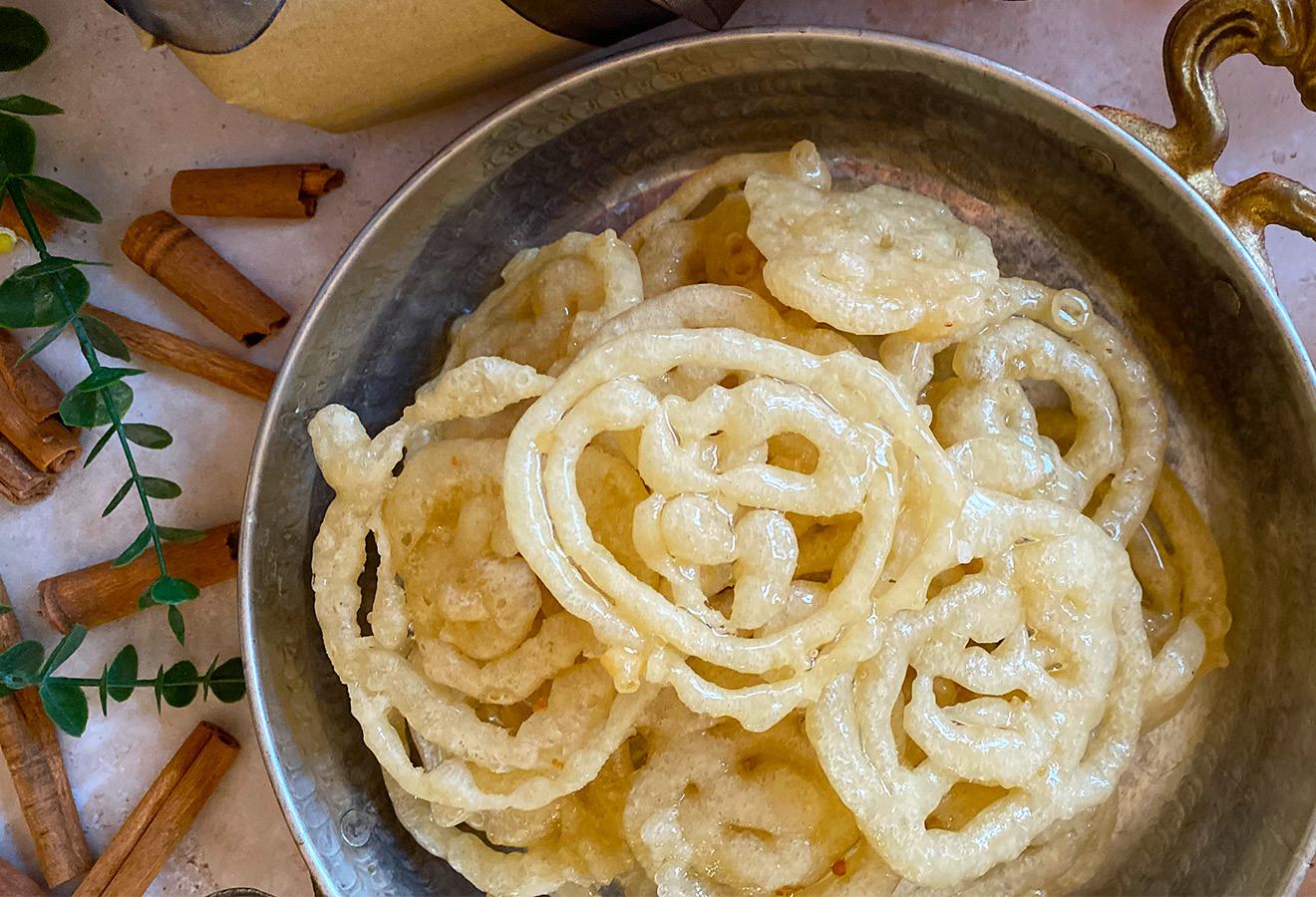
bia, sfenj, latkes or any of the other delicacies Jews enjoy at this time of year – waiting for the chance to taste them.
This year, my 5-yearold son stands next to me as I fry the zalabia – he is responsible for dunking them into the syrup, licking his sugary fingers as he goes, I’m sure, and admiring his handy work at the end.
In these troubled times, it brings me reassurance to think of the culinary traditions that have stood the test of time, through wars and atrocities. I am comforted that, like the Hanukkah story itself, we will come out the other side victorious — perhaps with a new festival or culinary traditions to celebrate the time in 2023 when Hamas attempted, and failed, to slay the Jewish people.
Note: You will need: a kitchen funnel and a squeeze bottle with a nozzle top.
Total Time: 2 hours 45 minutes
Yield: 30
INGREDIENTS
For the batter:
2 teaspoons dried yeast
2 cups warm water, divided 1 teaspoon sugar
1 pinch salt
2 cups plain flour
Neutral oil, enough oil to fill a pan, 4-5 inches deep
For the syrup:
3 cups sugar
1 cup water
1 teaspoon lemon juice
DIRECTIONS
Start by making the batter. Mix the yeast, 1 cup warm water, sugar and salt, and leave for 15 minutes until it foams on top. Add 2 cups flour and the remaining 1 cup water to the yeast mixture and mix well.
Leave in a warm place for 2 hours until the mixture is bubbling and smells yeasty. While the mixture is fermenting, make the syrup: Mix the sugar and water
together in a pan and bring to the boil. Once boiled, let it simmer until it thickens for approximately 7-8 minutes and coats the back of a spoon. Turn it off the heat and let it cool down while you finish the zalabia.
Once the zalabia batter is ready and has bubbled, using a kitchen funnel, pour the mixture into a squeeze bottle with nozzle top. Heat the oil until it is shimmering. Once it shimmers, squeeze the mixture from the squeeze bottle into the hot oil creating a spiral shape, approximately 3 inches wide. Do not overcrowd the pan while frying, as the zalabia will turn soggy.
Once the zalabia puff up and slightly change color, flip them over. Cook for another few minutes, when they begin to firm up and become slightly golden. Remove from the pan and drain on kitchen
paper.
While still warm, take each zalabia and drop into the warm syrup quickly, but ensuring the fritter is completely coated. Remove with a fork, shaking off the excess syrup. Serve warm or at room temperature.
“I recently had the air conditioning system on my 12 year old Porsche repaired. Both Gerry and Tracy are a delight to work with, and the results are always great and importantly, always done on time. Can't recommend them enough.”
BY EMMA NEWBERY
Hanukkah, the holiday of “dedication” or the “Festival of Lights”, is an eight-day holiday in the Jewish tradition that commemorates the destruction and re-dedication of the historic Second Temple in Jerusalem. While the holiday will always remain tied to that historical period, exploring how its message reverberates today allows couples of all religious configurations – including atheists! – to explore a beautiful tradition and make new meaning for themselves and their blended families and friends. Below are five suggestions for where to start:
1
The most hallowed perk of Hanukkah, whispered about incredulously by my Christmas-celebrating friends in middle school, was its eight-day span. At the time, that translated to eight potential opportunities for presents – an opportunity my family personally never availed itself of, but did exist in Jewish tween myth.
As an adult, I’ve found that the length of Hanukkah makes it a beautiful opportunity to expand the typical expectation of spending holidays with nuclear families that tends to happen around Christmastime, which is conveniently (or inconveniently, though I like to think not!) when Hanukkah starts this year. Make the holiday into a cooperative occasion by hosting a potluck dinner on one of the early nights of Hanukkah with friends, colleagues, chosen or biological family where everyone can bring a piece of their palate to the table.
2 In keeping with Hanukkah’s focus on time and natural resources (a very classic and crosscultural holiday ethos), the modern Hanukkah celebration cannot help but focus on the modern implications of making the Temple’s oil last for eight nights. This is the reason for the holiday’s length and menorah-lighting practice. In today’s world, that tale translates to sustainability, a value closely reflected in the Jewish mandate of
tikkun olam, repairing the world. Sustainability is both an accessible and imperative inroad for discussing Hanukkah with those who want to learn more about the holiday.
Making a menorah (the Hanukkah candle holder) or Hanukkah decorations from found or recycled materials is a fun way to personalize your menorah to your home, partnership or family. It also reinforces the importance of using what we already have and celebrating the gifts it can keep giving us.
Here’s a great tutorial on turning scrap paper around your home into handmade, recycled paper for notes, gifts or even sculpting! (Note: for those who are not artistically inclined, taking a winter walk and sourcing trash and litter to either recycle, dispose of or use for Hanukkah crafting by others is a great way to take part. See if you can find eight pieces or more around your home and neighborhood!)
woodlarkblog.com/diy-handmade-recycled-paper/
3I have found that Judaism’s strong foundation of social justice engagement and advocacy has been a welcome starting point for helping others to learn more about – and for me to crystalize – my Jewish practice. In thinking about the Jewish values most strongly represented in the celebration of Hanukkah, one dynamic that comes
to mind is oppression: the seemingly endless cycle of the powerful and the powerless.
Have a discussion with your partner (or a friend) about instances of power and powerlessness, on a personal, local, national or global scale. This can allow for both of you to share the way your identities and experiences shape how you move through the world, and identify avenues of social action like mutual aid, group advocacy and local volunteering as a strong pillar of your relationship.
Here are some local organizations that could use your time and energy, and who have been partners to the Alliance:
OpenDoors RI –
OpenDoors Rhode Island takes a “holistic approach” to support individuals returning from incarceration and reintegrating into our communities. The organization provides people with the material and emotional tools to create stable routines and move toward addiction treatment and recovery. It helps them find consistent work, particularly through its transitional housing initiatives, and employment program. I’ve worked with them on testimony to end solitary confinement in Rhode Island and found them to be wonderful partners.
opendoorsri.org/volunteeryour-time
Youth Pride, Inc. - Youth Pride, Inc.’s mission is to meet the specialized and ongoing needs of LGBTQ+ youth and young adults “through direct service, support, advocacy, and education.”
youthprideri.org/get-involved/ Jewish Collaborative Services - Jewish Collaborative Services (JCS) serves the greater Rhode Island area, without regard to religion, in senior housing, counseling, nutrition, and other services.
jcsri.org/about/volunteer/
4 Finding light in the darkest times is a crucial way to rest and renew yourselves. It encourages us to commit to the continued work ahead and connect with others who want to make a positive impact on their communities and the world. It may sound simple, but listing eight experiences, people or elements in your life that you value (or sharing one each night of Hanukkah) helps to ground you and your partner in gratitude.
5 When in doubt, do something Jewish that’s new to BOTH of you. For example, as a Jew of Ashkenazi (Central/Eastern European Jewish) heritage, I never grew up familiar with Mizrahi (Middle East/ North Africa/Parts of Asia) or Sephardic (Spanish/ diasporic from Iberian Peninsula) Jewish practices for Hanukkah. Even the playing field by exploring an element of Judaism neither of you have tried: lighting your menorah and cooking your holiday dishes with coconut oil, as is preferred by Jews in India. Or, honor the Yiddish word and Jewish communal theory of doikayt, or “hereness,” reflecting on diasporic homelands that have welcomed Jewish families. Do this by lighting an extra candle each night as has become “a hallmark [for] Sephar-
dic-Syrian Jews,” writes Jewish Journal columnist Tabby Refael, a Persian Jew.
“According to one interpretation, they arrived in safety in Syria after the expulsion on the first night of Hanukkah,” writes Refael.
“They viewed their arrival in safety as their own miracle.”
For Mizrahi Jews in Yemen and North Africa, the seventh night of Hanukkah is the “Festival of Daughters”, known as Chag Ha’Banot in Hebrew or Eid Al Banat in Judeo-Arabic. This festival celebrates “one of the best things Judaism has ever given to the world: Jewish women,” writes Refael.
This year, the festival falls on Dec. 31, 2024, which is also New Year’s Eve on the Gregorian calendar. Refael describes a celebration that “involves singing, dancing and lighting the hanukkiah [menorah] in honor of Jewish women.” Expand that notion and use the last night of 2024 to celebrate all the women and LGBTQIA+ individuals in your life, at a time when the country’s incoming administration has sent the message that its back is turned.
Plan to meet for a walk or coffee in the waning winter days of Hanukkah, send a sweet, natural surprise of local winter veggies, or reach out with messages of positivity and commitment to action to the women and LGBTQIA+ people you love. Trust me, it will go a long way toward keeping our guttering flame lit. We need it, however small, as we head into January 2025.
EMMA NEWBERY (enewbery@ jewishallianceri.org) is a staff writer and podcast host for Jewish Rhode Island.
• HOST an interfaith Hanukkah potluck dinner with friends, colleagues, chosen or biological family
• MAKE DECORATIONS for your own menorah (the Hanukkah candle holder) with found or recycled materials.
TAKE A WINTER WALK and source trash and litter from around your neighborhood to either recycle, otherwise dispose of properly, or use for above Hanukkah crafts
HAVE A DISCUSSION with your partner about instances of power and powerlessness, on a personal, local, national or global scale. Identify volunteer/other engagement opportunities in your community (RI examples OpenDoors RI, Youth Pride, Inc., and JCS).
• LIST 8 experiences, people or elements of your life that are meaningful to you (or share one each night of Hanukkah) to ground yourself and your partner in gratitude.
• DO SOMETHING JEWISH that’s new to BOTH of you: personal examples include cooking with/using coconut oil as some Jews in India do during Hanukkah, or lighting an extra candle each night as is customary for some SephardicSyrian Jews
• USE THE TAIL END OF HANUKKAH to honor and expand the Yemeni and North African Jewish Festival of Chag Ha’Banot (or Eid Al Banat) celebrating daughters and women in Jewish tradition on the seventh night of Hanukkah. Celebrate the women and LGBTQIA+ loved ones in your life through individual and community action!
SOURCES:
woodlarkblog.com/diy-handmade-recycled-paper/ stoptortureri.com/support-the-rha opendoorsri.org/volunteer-your-time youthprideri.org/get-involved/ jcsri.org/about/volunteer/ jewishjournal.com/commentary/columnist/326126/ beyond-gelt-how-mizrahi-jews-celebrate-hanukkah/ msnbc.com/top-stories/latest/lgbtq-crisis-hotlines-trump-antitrans-election-rcna179464
nclrights.org/2024-update-now-that-trump-has-been-elected-canour-marriage-be-undone/ guttmacher.org/2024/11/10-reasons-second-trump-presidency-will-decimate-sexual-and-reproductive-health
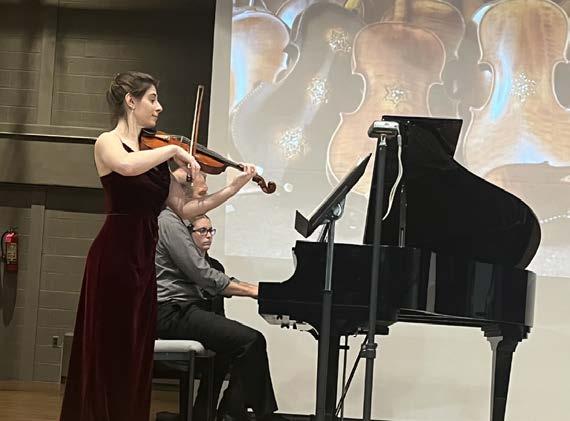
Kindle the Menorah on each of the eight nights of Chanukah. See below for the times, number of lights and the order of kindling. The Chanukah lights are kindled in the front window or by a doorway.
You may use olive oil or paraffin candles which are large enough to burn until half an hour after nightfall. Use the shamash to kindle the lights and place it in its special place on the Menorah.
All members of the family should be present at the kindling of the Chanukah lights. Students and singles who live in a dormitory or in their own apartments, should kindle in their own rooms.
Friday afternoon, the Chanukah lights (which will burn until 1/2 hour after nightfall) are kindled before the Shabbat candles. The Menorah should not be relit, moved or prepared, from the time Shabbat candles are lit, until Shabbat ends and the Havdalah prayer is recited
Before kindling the lights, recite:
1. Bo-ruch A-toh A-do-noi E- lo-hey-nu Me-lech Ha-o-lom A-sher Ki-di -sha-nu Bi- mitz-vo-sov Vi -tzi-va-nu Li -had-lik Ner Cha-nu-kah.
2. Bo-ruch A-toh A-do-noi E-lo-hey -nu Me-lech Ha-o-lam She- a-sa Ni-sim La-a-vo-sey-nu Ba-ya-mim Ha-heim Bi-z’man Ha-zeh.
Blessed are You, L-rd our G-d, King of the universe, who wrought miracles for our fathers in days of old, at this season.
The following blessing is recited on the first evening or on the first time one kindles the Chanukah lights this year:
3. Bo-ruch A-toh A-do-noi E-lo-hei-nu Me-lech Ha-o-lom She -he-chi-ya -nu Vi-ki-yi-ma -nu Vi-hi-gi-ya-nu Li -z’man Ha-zeh.
Blessed are You, L-rd our G-d, King of the universe, who has kept us alive, and has preserved us, and enabled us to reach this season.
Friday, Dec. 27, light before 4:02pm Shabbat, Dec. 28, light after 5:09pm Other nights any time after nightfal approx. 4:56pm
Wednesday, Dec. 25 After Nightfall
Thursday, Dec. 26 After Nightfall
Friday, Dec. 27
Saturday, Dec. 28 After Shabbat 5:01pm
Sunday, Dec. 29 After Nightfall
Monday, Dec. 30 After Nightfall
Tuesday, Dec. 31 After Nightfall
Wednesday, Jan. 1 After Nightfall
Provided as a public service by Jewish Rhode Island. Compiled by Chabad of RI
BY SARAH GREENLEAF
Gelt, literally “money” in Yiddish, often shows up around games of dreidel during Hanukkah. Though routinely given to children, there is also a tradition of giving gelt to teachers as a way to say thank you. Though not the largest part of Hanukkah, the tradition of gelt is incredibly nostalgic for many American Jews.
OFTEN AN afterthought (who hasn’t found themselves running to the closest drugstore to buy those tiny bags at the last minute!) gelt has had a glow up over the last few years. We decided to test a few varieties and found a clear winner in the Elevated Nostalgia category. See’s Candy makes a classic gelt that testers described as “so nostalgic.” One tester even remarked, “I kept eating them!” a true testament to a good gelt. The See’s Candies gelt also stood out for coming in two different coin sizes. Another tester added that it, “tastes like the one I grew up with. The gelt purchased from nuts. com comes in great quantities, but along with not being certified kosher, wasn’t particularly popular with our tasters who described it as chalky and crumbly.
Another popular gelt was the dark
chocolate one from Lake Champlain Chocolates. “This one is for the grownups’ table,” one tester noted. The gelt from No Whey, a dairy-free brand, didn’t score as well with our testers and didn’t have individually wrapped coins. It lacked the taste profile of its dairy counterparts and while a good option for those who can’t have dairy, it wasn’t in competition with the chocolate that contained dairy.
Another option people enjoyed for the visuals was the Maccabee Chocolate purchased through ModernTribe, “these are pretty,” one taster exclaimed. The gelt foil comes in a range of bright colors that people enjoyed, though the taste was “typical gelt.” Overall, there are a wide range of options for gelt if you are planning ahead. All of these were ordered online, but the
Lake Champlain gelt can be found in-store at Whole Foods and smaller specialty stores, like Stock, have some higher-end gelt options. And if you don’t want to break the bank, just buy the good gelt for the grown-up’s table!
The clear winner: www. sees.com/hanukkah-gifts/ hanukkah-gelt/200896.html
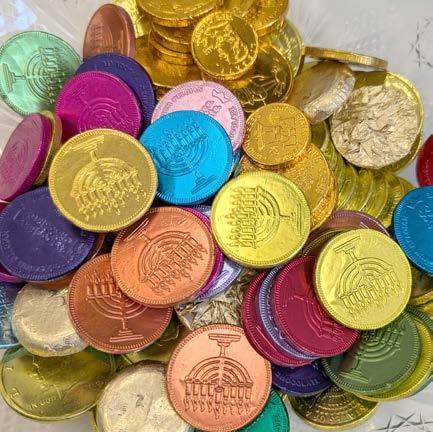
Dark chocolate option: www.lakechamplainchocolates.com/gelt-darkchocolate-coins/
Dairy-free: nowheychocolate.com/ seasonal/chanukah-chocolate/ chocolate-gelt-coins/
The prettiest: moderntribe.com/ products/premium-quality-belgiandark-chocolate-gelt-nut-free
Not Kosher: nuts.com/ chocolatessweets/premiumchocolates/classics/gold-coin/1lb. html
SARAH GREENLEAF (sgreenleaf@ jewishallianceri.org) is the digital marketing specialist for the Jewish Alliance of Greater Rhode Island and writes for Jewish Rhode Island.

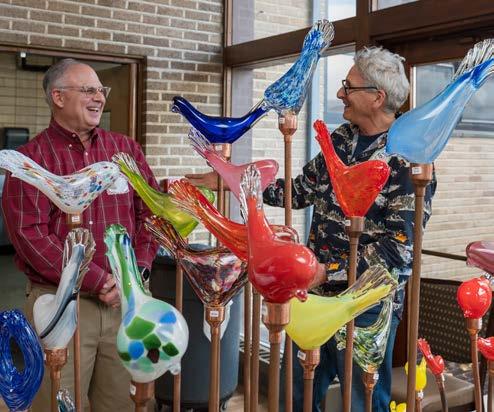
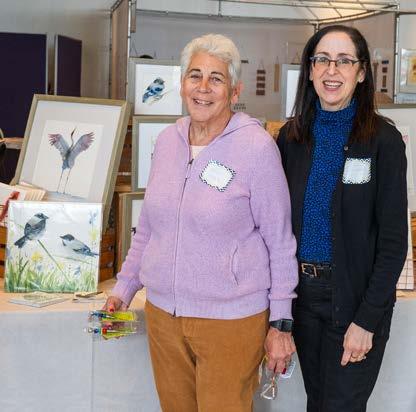
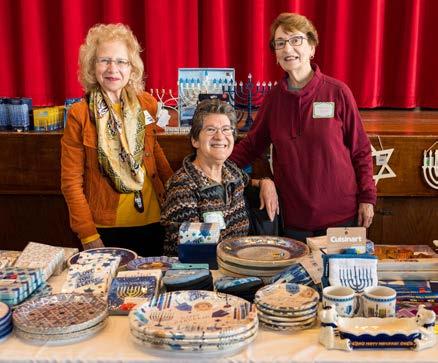
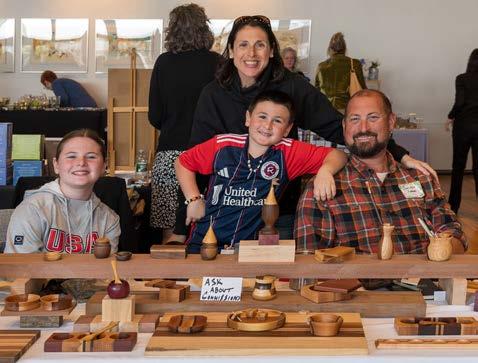
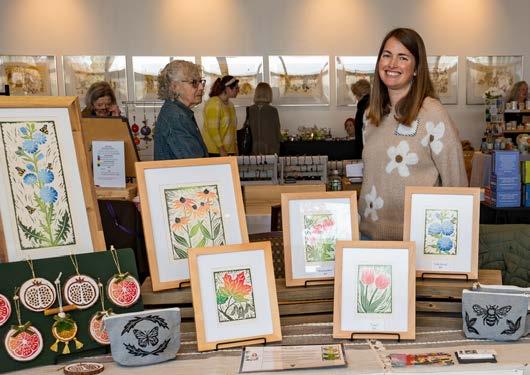
BY BEN SHRAGGE
This story originally appeared on Kveller.
There’s nothing wrong with being born on Christmas. Many noteworthy individuals have a Dec. 24th or 25th birthday. Not, of course, Jesus, whose birthday is never mentioned in the Gospels. His big day was chosen by the Romans centuries after his death, likely to supplant pagan holidays that fell at the same time. But regardless of murky origin stories, the list of legitimate Christmas babies includes the scientist Isaac Newton, film star Humphrey Bogart and metal singer Lammy Kilmister. All legends in their fields.
STILL, WHEN OUR DAUGHTER was given a Dec. 24 due date, my wife and I had some reservations. A winter birthday in New England is dreary enough already. But a Christmas birthday risks becoming an afterthought. Friends wouldn’t be around for parties. Birthday balloons would be eclipsed by Christmas lights. Nativity scenes would remind our daughter that, for much of the world, someone else’s birth was more important. No matter how special your parents say you are, it’s hard to compete with being called the son of God.
Then again, there were pros to her having a Christmas birthday. The date would be easy to remember. She’d always get a holiday from school or work. The Jewish obstetrician would be available for the delivery. And, as Jews ourselves, we’d finally have a reason to celebrate on Christmas. For us, too, Yuletide would now be a season of gift giving, good cheer and hymns to a momentous birth. (Though admittedly, the “Happy Birthday” song lacks the gravitas of “Silent Night.”) Maybe we’d even crack some eggnog in the hospital to celebrate.
What to do on Christmas is a paradoxically Jewish question. (For Christians, even nominal ones, it’s not a question: you celebrate.)
Historically, Christmas was a dark period for European Jews, who faced the perennial accusation of killing Jesus. To avoid being attacked, the traditional advice (and sometimes the law) was to stay indoors. For an embattled minority in Christian-dominant
countries, Christmas was a time to be wary, not to be merry. So while even many non-Christians celebrate Christmas in America now, the Jewish relationship with the holiday remains fraught. Today, thankfully, some less somber Jewish Christmas traditions than hiding out in fear have developed. Members of Chabad hold night-long chess tour naments on Christmas Eve. Other Jews go out for Chinese food and see a movie on Christmas Day. And some Jews, especially those with non-Jewish partners, do celebrate Christmas, perhaps adding a Star of David ornament to their tree. Now, it seemed, my household would have a Jewish Christmas tra dition to call our own. We wouldn’t be getting a tree, but there would be presents under the mezuzah on Christmas Eve.
However, as it turned out, our Jewish Christ mas birthday celebra tion wasn’t meant to be. My wife went into labor three weeks before her due date, which in 2021 meant day seven of Hanukkah. (Or, to be more precise, the middle of the night on day seven.) After over 14 hours in the delivery room, our daughter was born on the evening of Dec. 5, right around the time we would have been lighting the menorah for day eight. She was, we like to say, our Hanukkah miracle. And since her birth took the place of lighting the candles, it only seemed
right to name her Liora, which is Hebrew for “light of mine.”
It’s not as if we would have named her Holly and decked the halls if she had been born on Christmas Eve. And a Christmas birthday, I’m sure, really isn’t so bad.
days – about a Jewish baby due on Christmas arriving on Hanukkah instead. You can call it a simple twist of fate, or you can wonder, to quote G.K. Chesterton, if “coincidences are spiritual puns.” Maybe some babies just happen to be born on one significant date instead of another. And maybe some oil just burns for an exceptionally long time. But having witnessed my daughter’s birth, I’m open to the possibility of a touch of the divine.
Although it roughly coincides with Christmas, Hanukkah is a comparatively small Jewish holiday. Unlike larger Jewish festivals, there are no solemn rituals to outweigh a birthday celebration. A
birthday means remembering slavery and eating unleavened cake. A Hanukkah birthday means one more reason to shine a light and eat oily foods. Instead of being overshadowed by a major festival, our daughter’s birthday has upgraded the status of a minor one.
In our household, at least, the revolt of the Maccabees has been joined by a new Hanukkah story: the miraculous early birth of a Jewish Christmas baby.
BEN SHRAGGE is the editorial director of an ed-tech company and has written for publications in the United States, Canada, and Israel, including The Globe and Mail, Segula Magazine, and Hamilton Jewish News. He

BUSINESS 35 | OBITUARIES 36


BY DOUGLAS STARK
For as long as Ben Reuter can remember, he has always been sailing. In fact he cannot remember a point in his life when sailing was not integral to his experiences. A sport he fell in love with at a very young age has now, at 14, become a passion, one that has allowed him to sail competitively around the world.
MAKE A DIFFERENCE!
Rhode Island area schools seek part-time Hebrew and/or Judaica teachers, and substitute teachers for the 2024-2025 academic year.
IN APRIL , Ben helped the combined Team USA finish in first place among international sailing teams at the Magic Marine Easter Regatta that was hosted by the Braassemermeer Sailing Club located outside of Amsterdam.
improvement. It is also the result of a great passion and a work ethic that is obvious to all who meet him.
“I haven’t met many who love the water as much as Ben. Always willing to come to practice and always ready to go sailing,” noted Joakim T. Karlsen of JK Sailing LLC, an organization that works to develop elite sailors.
have a two-person crew. His training has taken place in several locations including the Barrington Yacht Club, JK Sailing, and he continues it now as a freshman at Barrington High School with the Barrington High School Sailing Team.

For more information contact Dori Adler at the Jewish Alliance at 401.421.4111 ext. 179 or dadler@jewishallianceri.org.

For Ben, the competition proved to be a high point in what is fast becoming an impressive sailing resume. At the Regatta with 180 participants, Ben finished 27th overall while earning the second-best finish for Team USA. This was one of three international competitions he has qualified for and the second that he competed in. The other was a regatta in the Bahamas.
His success nationally and internationally has been the result of many years of hard work and progressive
Ben began sailing at the age of 5. A year later, he started sailing dinghies and keelboats. Typically, dinghies are less than 20 feet long and do not have weighted keels to keep them upright. They are easy to maneuver and can accelerate fast. Keelboats, on the other hand, have a weighted keel that offers more stability and better tracking in the water. It is the usual progression for someone wanting to race competitively.
At the age of 8, he started sailing the Optis, which is a small dinghy often used by sailors under the age of 15. It is one of the two most popular dinghies in the world. A year later, competitive sailing became his next step. He is now sailing 420s, which
“Ben loves all kinds of boating: whether he is sailing in a dinghy, racing on a keelboat or driving a powerboat, he is happiest on the water,” says Benjamin Chwalk, Barrington High School Sailing Coach. “It’s not uncommon to see Ben come in from a day of dinghy racing and jump on a keelboat for an evening series.” His hope is that sailing will be the sport of a lifetime. He is brilliantly positioned for this to be the case, and his passion and determination point to a bright future for this young athlete.
DOUG STARK , of Barrington, is a writer, museum consultant and sports historian. If you have any Rhode Island Jewish athletes you’d like to see us interview, contact editor@ jewishallianceri.org.
BY BRAD SWARTZ
The Jewish Alliance’s largest overseas partner, the American Jewish Joint Distribution Committee (the Joint or JDC), acts as our global emergency response partner, working in 70 countries around the world. The 110-year-old Jewish humanitarian organization’s mission is to save Jewish lives, build Jewish life, empower Israel’s most vulnerable populations, and respond to disasters and crises impacting all people. JDC plays a central role in the work between the Alliance and its partner regions: Warsaw, Poland; Rosario, Argentina; and Afula-Gilboa, Israel.
VICTORIA BLINT MIDRONY, JDC’s Senior Director of Global Resource Development, says, “We are grateful to have the Jewish Alliance of Greater Rhode Island as a vital partner. We draw on our shared commitment of helping vulnerable Jews and strengthening Jewish communities. Our work together represents a deep belief in the Jewish value of mutual responsibility that becomes more crucial daily amidst the conflicts in Israel and Ukraine and surging antisemitism.”
In Poland, JDC works directly with the Warsaw JCC, which it founded in 2013 and is now a center of Jewish life that welcomes 3,000 program attendees annually. Some highlights of their activities include cultural events, weekly classes, a women’s Rosh Hodesh group, and children and youth programs, serving residents, Israeli expats, and Ukrainian refugees of all ages.
Among other projects, JDC has a presence in 14 Jewish communities in Argentina that are struggling due to the current deep recession and 193% inflation rate. JDC is providing poor Jews with food assistance and subsidizing rent and utilities. The organization is also working to strengthen these communities by cultivating lay

and professional leaders and volunteers. They are teaching them how to monitor, measure, and evaluate projects and programs and conduct community decision-making. To connect Jewish communities and help them be resilient, JDC holds regional meetings for social service professionals and volunteers from 12 communities across six Latin American countries. This enables the sharing of ideas and best practices.
In Israel, JDC’s work is imperative. Even before Oct. 7, they were our on-the-ground agency in all Israel matters. More than 1 million Israelis benefitted weekly from JDC-developed programs. Since Oct. 7th, JDC has directly aided more than 450,000 of the hardest-hit Israelis. JDC’s response to the ongoing war has been incredible. JDC is addressing Israel’s national mental health crisis by implementing vetted mental health and trauma programs. These include online platforms that offer hundreds of therapeutic options, quiet rooms, and its Hibuki therapy for traumatized children. JDC is also providing medical equipment and safety kits to communities under fire in the north of Israel. And it is bolster-
ing economic recovery by providing employment support services to evacuees, reservists, and the newly disabled as well as assistance and training to vulnerable businesses.
On this work with our partner regions, Blint Midrony continued, “The Jewish Alliance plays a pivotal role in sustaining a diverse range of JDC’s work in communities around the globe – from Poland, by helping the JCC in Warsaw become a dynamic hub of Jewish life as well as serving as a steadfast pillar of support and source of hope for both residents and Ukrainian refugees; to Argentina, by ensuring basic human needs and relief services are provided to vulnerable Jews struggling with poverty due to socioeconomic turbulence; to Israel, where each day, in addition to providing core programs and services for the most vulnerable, we are addressing the growing war-time emergency needs of the hardest-hit
Israelis.”
The work of JDC is too vast to be explained in one article. The work they do is crucial in helping the lives of Jews EVERYWHERE.
Every gift to the Alliance Community Campaign honors these priorities and reaches partners such as JDC. Should you wish to make a difference and get involved in the allocations process, through committee membership or contributing to the Community Campaign, visit: https://www.jewishallianceri. org/support-us/featured/donatenow. You may also contact Brad Swartz, Fundraising and Partnership Manager, directly at bswartz@ jewishallianceri.org.
BRAD SWARTZ (bswartz@ jewishallianceri.org) is the fundraising and partnership manager at the Jewish Alliance of Greater Rhode Island.

BY SHAINA WEINTRAUB
On Sunday, Nov. 17, 2024, the Rhode Island Chapter of Hadassah hosted an online program as part of its ongoing “Let’s Talk” community series. The event, “Find Out. Speak Out About Antisemitism,” brought together 30 Hadassah members and guests to learn about and discuss issues related to Zionism and antisemitism. To guide the conversation, Hadassah invited Dr. Andrew Pessin, a noted philosopher, professor, and author of “AntiZionism on Campus: The University, Free Speech, and BDS,” to address the recent rise in antisemitic incidents sparked by the war in Israel.
ANTISEMITIC INCIDENTS have been increasing across the United States since the war began on Oct. 7, 2023. The Anti-Defamation League’s 2023 report showed a 140% rise in antisemitic incidents from the previous year, marking the highest number recorded since the organization began tracking these events in 1979. Reports have
surfaced from public spaces, private homes, and college campuses. Closer to home, earlier this year, the FBI investigated violent threats sent to leaders of Brown University and Rhode Island School of Design’s Hillel.
In response to this alarming trend, Hadassah Rhode Island is leveraging its platform to educate
members and guests about Zionism and the history of Israel and Palestine, emphasizing that knowledge is a powerful tool against hate. Roberta Schneider, a member of the Program Committee for Hadassah of Rhode Island, opened the program by asserting that one of the most effective ways to combat antisemitism
is to address anti-Zionism head-on. By inviting Dr. Pessin to present, the organization aimed to provide attendees with historical context and tools to “[Refute] the Lies Against Israel.”
Pessin, a philosophy professor at Connecticut College in New London and a Providence resident, brought both local expertise and a scholarly perspective to the discussion. He has authored several books on the subject, including “Anti-Zionism on Campus” and “Poisoning the Wells: Antisemitism in Contemporary America.”
His interest in these topics, stems from his philosophy background and his study of Jewish thinkers, which led him to explore the hostility toward Israel prevalent on college campuses.
So, how can everyday people fight back against
antisemitism?
“It’s hard to refute the lies,” Pessin acknowledged. “You need to know a lot, and you need to be courageous to talk back to people. But it’s essential.” He described these “lies” as part of a deliberate campaign to “dehumanize, delegitimize and demonize Israel and Jews as the epitome of evil,” a campaign that he argued justifies actions like boycotts, persecution, and even physical violence, as seen in the Oct. 7 attacks.
During his presentation, Pessin addressed what he called the four “Big Lies” surrounding (1) “Palestine,” (2) “Zionist Jews,” (3) “Ethnic cleansing,” and (4) “Settler colonialism.” He argued that the way these topics are framed in higher education goes beyond misinformation,
CONTINUED ON PAGE 27
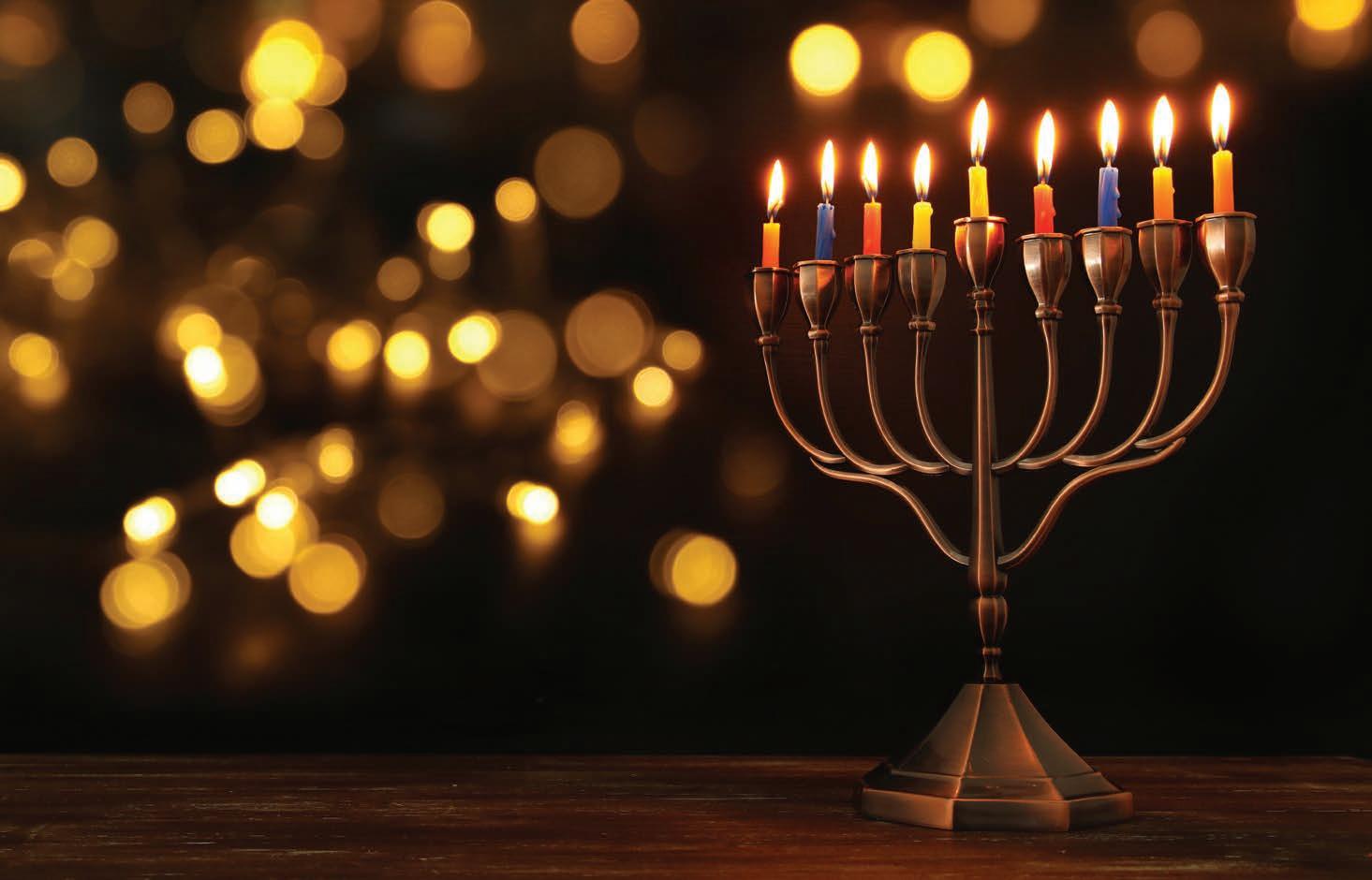

Harris Chorney Chair of the Board

Adam Greenman President & CEO


BY EMMA NEWBERY
As a school year unfolds in Rhode Island, campus Hillels are reflecting on the turbulent year behind them and taking stock of the ways in which Jewish life on college campuses continues to thrive. On Oct. 29, Hillel directors from Rhode Island colleges and universities gathered virtually with the Jewish Alliance of Greater Rhode Island to reflect on a year of growth and challenges and share their aspirations for the upcoming school year. The Zoom meeting gave community leaders a chance to hear from directors of Hillels at Brown/RISD, Bryant University, and the University of Rhode Island (URI). The gathering highlighted the progress and resilience within Rhode Island’s Jewish student communities.
RABBI JOSH BOLTON, executive director of Brown RISD Hillel, cited the significant growth in Jewish life at Brown and RISD in recent years. “Over the past three or four years, the number of students coming from Jewish day schools to join Brown and RISD has grown in a really exponential way,” he said. “The university has built kosher dining in the main food halls; the largest Shabbat minyan is the Orthodox minyan.”
“You know, the past year has been very difficult,” he acknowledged. “It has been, as I know [...] my colleagues in Rhode Island know, it’s been kind of all-hands-on-
CONTINUED FROM PAGE 26
reflecting bad-faith narratives. He provided historical context on issues such as the origins of Jews and Palestinians in Israel and the West Bank, debunked the narrative of “ethnic cleansing,” and discussed the legal and historical ownership of the land.
After his talk, participants had the opportunity to share their feelings, frustrations and questions. Hadassah member Ronnie Sirota raised concerns about the lack of historical education in Hebrew schools, noting that her children learned about
deck, really deep strategic thinking required, a lot of crisis management.”
But that does little to dull Jewish life on campus, argues Bolton. “The fact of the matter is,” he added, “from a very visible perspective, or a very visible metric, Jewish life has been growing on campus.”
Rabbi Steven Jablow, Hillel director at Bryant University, spoke passionately about the unique experience of Jewish students on his campus, which he witnesses directly as the director of Campus Ministry. “As odd as it might be when you hear only the negative stuff in the media, [...] Jewish life
Israel but not its history. She suggested incorporating more historical context into the curriculum, a point with which Pessin agreed.
The conversation also touched on the challenges of combating anti-Zionism on social media. Deborah P., another participant, expressed frustration with the misinformation circulating online and the difficulty of engaging in fact-based discussions.
“I’ve tried to comment back until I just can’t anymore,” she said. “One of the arguments people use is, ‘How can you prove that my numbers are wrong?’” Pessin validated
at Bryant is really thriving,” Jablow said.
Jablow’s position as director of Campus Ministry is a unique one. “In the great majority of our campuses across the country,” he explained, the position is “usually [...] held by a Christian minister or priest. But as the rabbi on campus who’s also here, the only chaplain who’s here full time, it gives an opportunity for full-time engagement with the Jewish community, as well as the entire community.”
Jablow described a recent day on campus that underscored the sense of belonging Hillel fosters. “Just down the hall from the room that I’m in right now, there are eight students hanging out,” he said. “There was a chemical leak in the other building, and [...] classes were canceled. There’s no danger, no huge risk, but classes got canceled, and all of a sudden there were eight kids who are Hillel members hanging out in the campus ministry office. Of those eight, five are first-year students. The engagement is really what has me very excited. The students are getting actively involved in leadership roles, in creating new programming, and saying, ‘Why don’t we do this?’ To which my response is, ‘Why don’t you help me make that happen?’”
Amy Olson, director of
her concerns and recommended equipping oneself with researched facts and statistics when responding.
“This is a multifront war,” Pessin emphasized. “It’s happening on campuses, in military battles, in courts, in cognitive spaces and on social media. It’s everywhere we turn, and we need everyone doing what they can, where they can.”
As Pessin showed the group, with the rise in antisemitism, events like this remind us of both the urgency of addressing hate and the solace found in collective action. The persistence of antisemitic incidents –
URI Hillel, also expressed her enthusiasm for new initiatives on her campus, particularly an upcoming interfaith “Friendsgiving” event. “One of the things that we’re excited about this year is a student has really come on board to champion an interfaith Friendsgiving program that we’re working with the Chaplains Association,” Olson explained.
“She’s putting together a team of students to do a program the week before Thanksgiving, kind of a potluck-type of thing that we received a grant from Hillel International for interfaith programming to do.”
In addition to Friendsgiving, URI Hillel has introduced community service opportunities through its service engagement interns.
“We have a team of students who are serving as service engagement interns,” said Olson. “Each of them [...] have picked community service projects that they’re working on throughout the year. Sometimes they’re working with Jewish students, and other times they’re just working with organizations in town, providing meals to the homeless, doing environmental work – things that really speak to them.”
Olson highlighted a particularly meaningful collaboration with Repair the Sea, a Jewish environmental organization. “We joined with one of the URI alums
whether on college campuses, in public spaces or online – underscores the gravity of the issue and the need for vigilance.
Gatherings like Hadassah’s “Let’s Talk” series offer a space for shared learning, mutual support and community resilience. “Let’s Talk” furthers the organization’s commitment to empowering Jewish women with the tools to amplify their voices and fight antisemitism. By providing attendees with historical context and actionable talking points, the event helped to equip participants to engage in meaningful conversations and formulate
from a few years ago who’s now working for Repair the Sea,” she explained. “They spearhead the Reverse Tashlich program around Rosh Hashanah [...] instead of throwing things, throwing their sins into the water – to gather up garbage that’s on the beach and take it away from the water.”
Stephanie Hague, chief strategy officer at the Jewish Alliance, shared a personal connection to Hillel, adding warmth to the discussion about its role in building connections. “I actually met my husband at Hillel during our time at NYU,” she recalled with a smile. “Hillel has always been a powerful force for connection, not only in religious or cultural terms but in lifelong friendships and even families.”
As the meeting concluded, participants expressed gratitude for the opportunity to connect and learn from one another. The Jewish Alliance of Greater Rhode Island looks forward to supporting the state’s Hillels in the year ahead, uniting in their mission to foster a vibrant, welcoming Jewish community across Rhode Island’s college campuses.
EMMA NEWBERY (enewbery@ jewishallianceri.org) is a staff writer and podcast host for Jewish Rhode Island.
answers to harmful narratives. It also helped attendees understand that they are not alone in the fight.
To learn more about Hadassah Rhode Island and attend future “Let’s Talk” programs, visit hadassah.org/chapter/ rhode-island.
SHAINA WEINTRAUB of Providence is a freelance writer, photographer and podcaster.

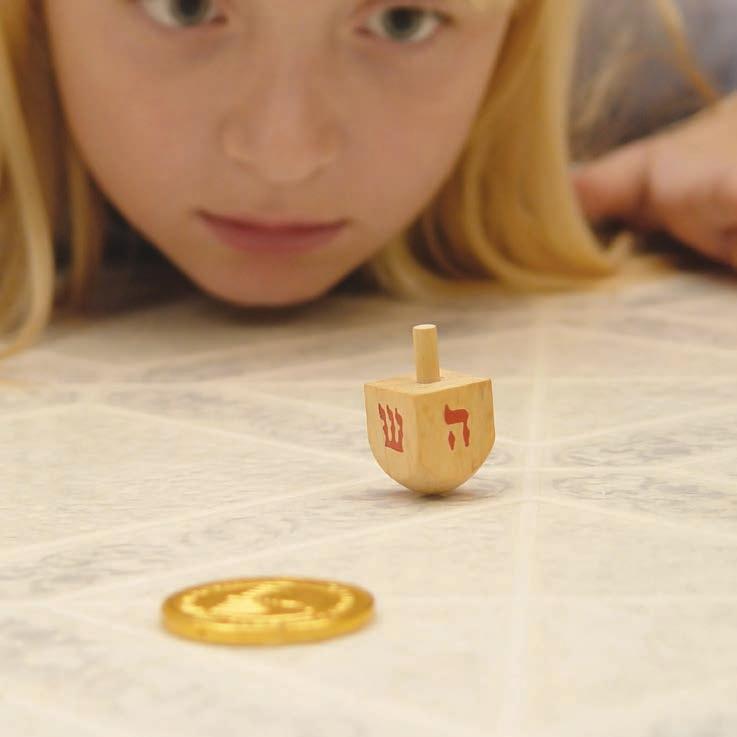


BY JESSICA HOARD
WARWICK – Jewish Collaborative Services (JCS) 7th Annual Meeting was an evening of heartfelt celebration of the agency’s achievements over the past year, honoring exceptional individuals and welcoming new leadership. The recent event, held at Tamarisk Senior Living, brought together community leaders, staff and volunteers, as they reflected on JCS’s enduring commitment to strengthening the wellbeing of Rhode Islanders for generations.
DAVID CICILLINE , president and CEO of the Rhode Island Foundation, hosted the event. Rabbi Heather Shore, JCS’s new clinician and chaplaincy Rabbi, opened the evening with an inspiring D’var Torah, emphasizing the interconnectedness of past, present and future contributions.
“We are part of a broad network of interconnected relationships,” she shared. “Each step forward strengthens the foundation laid by those who came before us and prepares the way for those who will follow.” This message echoed throughout the evening, reinforcing the importance of collective action and visionary leadership.
Adam Greenman, President of the Jewish Alliance,
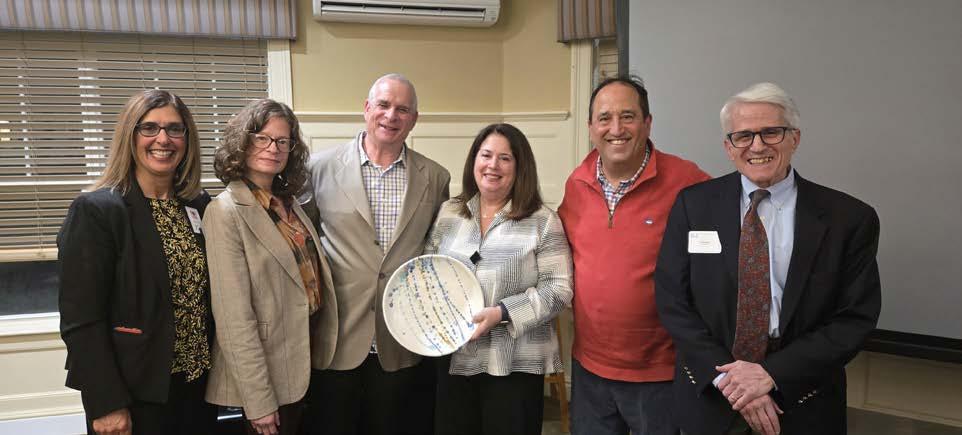
Morris, Lisa and Alex Kaufman, Stacy and Doug
recipients with the Wolf Award for
followed by highlighting the partnerships that bolster JCS’s mission. A “Year in Review” video showcased the agency’s wide-reaching impact through its programs and communities, and gave the audience a greater sense of connection to the work JCS did this year.
The meeting also honored individuals whose contributions embody JCS’s values of compassion and community. The Arnold and Sheila Kaufman Family, including Stacy and Doug Emanuel and Alex and Lisa Kaufman, received the Ruth and W. Irving Wolf Jr. Award for Multigenerational Philanthropy, recognizing decades of support and volunteerism.
Board Member Myrna Levine was presented with the Maurice Glicksman
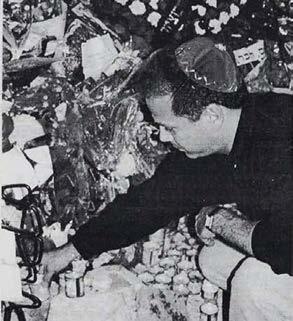
Leadership Award for her role in JCS’s merger and her steadfast advocacy for Jewish older adults and their caregivers.
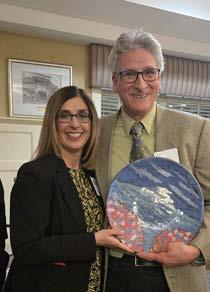
Neal Drobnis, coordinator of the Kosher Senior Café and Kosher Meals on Wheels, was celebrated with the Erin Gisherman Minior Award for Staff Excellence, honoring his 15 years of dedicated service, and the heart and compassion he gives to those he serves.
In addition to these recognitions, the Annual
Meeting marked a transition for members of the board. Newly elected board members were officially installed: Marcia Werber Feldman, nurse and social work professional; Hal Matzkin, a retired sales executive passionate about community engagement; and Dr. Jeffrey Rogg, a retired radiologist and educator. Renewing their terms were long-standing leaders Jim Galkin and Doug Emanuel, along with Marisa Garber, appointed for a year as a presidential appointee. Minna Ellison and Kayla Rosen stepped into roles as
Secretary and Vice President, respectively. Embodied in the words of Rabbi Shore: “We are, at JCS, a diverse ecosystem beating with a pulse of care for our whole community here in Rhode Island.” This sentiment underscores JCS’s commitment to honoring its legacy while embracing a brighter, more inclusive future, uniting generations in support of a stronger, more compassionate community.
JESSICA HOARD is the Senior Manager of Marketing and Communications at Jewish Collaborative Services.

THE ASSASSINATION OF YITZHAK RABIN, then-prime minister of Israel, was one of the most dramatic events of the 1990s, sending shockwaves throughout the Jewish Diaspora. The Dec. 7, 1995, issue of the Jewish Herald shows David Cicilline placing a candle on Rabin’s grave in Mount Herzl Cemetery, Jerusalem. Hundreds of thousands of mourners, including 80 heads of state, attended Rabin’s funeral, which took place only two days after Rabin was shot and killed trying to enter his car on Nov. 4, 1995. By coincidence, Cicilline was on vacation in Israel at the time, after having served his first year in Rhode Island’s House of Representatives. Newspaper courtesy Rhode Island Jewish Historical Association







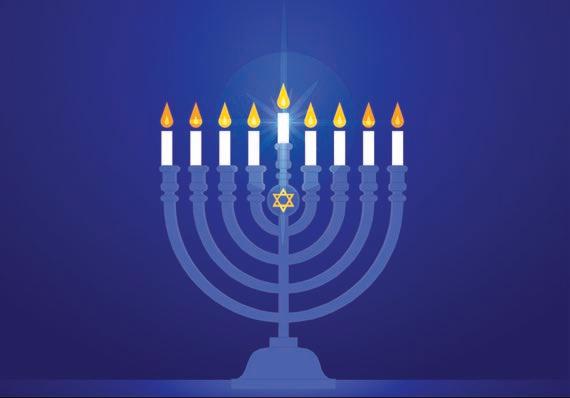



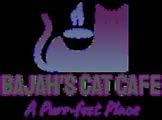

On Monday, Oct. 28, the Jewish Federation Foundation of Greater Rhode Island (JFF) honored the Dor L’Dor Society with a special event featuring two young, local Jewish chefs. In an airy room at the Providence Public Library, Jordan Fleischer and Moshe Karlin shared with attendees how their Jewish roots and a grandmother’s coking have sparked their culinary creativity and their professional steps.
WHILE WORKING TOGETHER at a Providence restaurant, Fleisher and Karlin, both Johnson and Wales graduates, discovered their mutual affection for traditional Jewish food. A Nov. 30, 2023, article in “Hey Rhody” tells how they were inspired by Anthony Bourdain’s pronouncement that Jewish food is “insanely delicious” and “vastly underrated.” They decided to “take traditional Jewish dishes and bring them
CONTINUED FROM PAGE 16
foundation’s core commitment of supporting the Jewish community. (The Jewish Telegraphic Agency’s parent organization, 70 Faces Media, is among the many Jewish groups that receive funding from the Schustermans.)
The two organizations didn’t make their leadership available for interviews, opting instead to release statements. Adamah, which has referred to climate change as “the existential crisis of our times,” said in its statement that the partnership reflects a shared vision about making a positive impact on the Jewish community and the planet.
“We are grateful that Schusterman Family Philanthropies allow us to expand our efforts in creating a more sustainable and equitable future,” Adamah said. “We also recognize the Schusterman family’s roots in the energy industry and appreciate their commitment to leveraging their philanthropic resources to drive positive environmental change.”
The foundation’s statement suggested the donation is an expression of the Schusterman family’s long-held values rather than any kind of break with the family business.
“The Schusterman family believes abundant, affordable energy is vital to the economic well-being of the world’s growing population
upscale a bit” and explode the myth that Jewish food is mushy and tasteless as some believe. This led to the development of their Nice Jewish Boys Brunch. (https://www. instagram.com/nicejewishboysbrunch/).
Among the innovative and inspired brunch offerings was the delicious pumpkin kugel with negro mole and pepita granola that JFF attendees were treated to. As JFF Chair James Pious shared with guests during
and has made limited investments in environmental education and efforts to protect the environment,” the statement says. “Adamah, which is among the leading Jewish organizations engaging in environmental education, is one of these investments. The Schustermans remain proud that their family business has enabled them to invest significant resources toward their philanthropic priorities, which include advancing racial, gender and economic equity in the U.S. and strengthening both the Jewish community and Israel.”
The Schusterman name has been associated with Jewish philanthropy and leadership for many decades.
Charles Schusterman, the family patriarch, died in 2000, which left his wife, Lynn, and daughter Stacy in charge of the family’s oil business and foundation. In 2011, the Schustermans sold the company for $7.2 billion, allowing their philanthropy to massively grow.
Today, the foundation is led by Stacy, who founded her own oil company, Samson Energy, after the sale, with a focus on drilling in Wyoming. Her politics are unusual for an oil and gas billionaire. For example, among the top political donors from the fossil industry over the past several elections, Schusterman’s Samson Energy is the only one to favor the Democratic Party over the more
his greeting, “It is with great pleasure that we welcome a creative link between our shared Jewish traditions and our Jewish future through food!”
The Dor L’Dor Society is a special group of donors who have established ways of supporting our community in perpetuity. A legacy gift is such a meaningful way to ensure sustained funding for what matters most to donors and their families. For more information or your planned
climate-skeptical Republican Party, according to OpenSecrets. Schusterman has also expressed specific support for President Joe Biden’s climate agenda and cited the significance of climate change in making clean technology investments. Her views stand out in an industry that has traditionally funded climate denialism and has been vilified by the climate movement over the impact of fossil fuel emissions on the planet.
Adamah, which means “earth” in Hebrew, is part of the climate movement, but its focus on the issue is relatively recent and the group has never engaged in attacks on the oil and gas industry. Formed in 2023, Adamah is the product of a merger between Hazon, a New York City-based environmental group, and the Pearlstone Center, a retreat center specializing in outdoor education outside of Baltimore. It shares a name with the Adamah Farm Fellowship, a program it runs for young Jewish adults founded in 2003 that combines farming and Jewish learning and community.
Last year, Adamah launched its signature climate initiative, the Jewish Climate Leadership Coalition, uniting 20 of the most prominent Jewish institutions with significant representation of denominations from
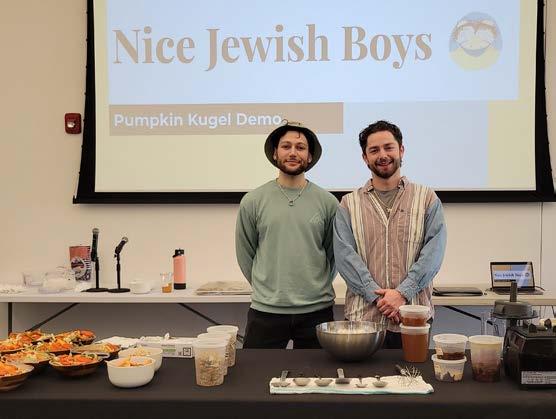
giving options, contact the Development team: endowment@jewishallianceri.org or 401-421-4111.
Submitted by Claire Uziel, endowment and campaign operations manager, Jewish Alliance
Reform to Orthodox. Hillel, the Jewish Federations of North America, Birthright, the Foundation for Jewish Camp and Moishe House are among the marquee founding partners of the coalition.
Members publish annual plans detailing past actions and commitments toward reducing greenhouse gas emissions and mobilizing constituents around climate. There are no mandates. Each member decides what to include, which can range from installing solar panels to a community gathering centered on discussing the issue.
Adamah’s approach of building consensus by letting allies decide what measures are helpful contrasts with the strategy pursued by the other major Jewish climate group. Dayenu, whose name means “enough” in Hebrew, is more activist, mobilizing the Jewish community to demonstrate against oil companies and vote for climate-friendly
politicians and policies. Dayenu also pressures Jewish institutions to divest their endowments from the fossil fuel industry in protest, which several have recently done.
Despite the differences, Dayneu’s recent wins and Adamah’s grant from the Schustermans are part of same wave, an awakening of Jewish institutions, beginning last year, to the role they can play in addressing the climate crisis.
“It’s the beginning of what will become a more widespread focus among Jewish groups,” Rabbi Jennie Rosenn, the CEO of Dayenu, said last year. “We’re seeing an awakening to this as a profoundly Jewish issue, and awakening to the role that the Jewish community has to play in addressing the climate crisis.”
At the Jewish Alliance, we believe all people should be treated fairly and justly. If you have experienced or witnessed an incident of anti-Semitism or extremism, please report it. Anti-Semitic activity includes overt acts or expressions of anti-Jewish bigotry and hostility. Many incidents are not crimes but are still considered anti-Semitic and should be reported.
This initiative is meant to help track anti-Semitic incidents in the state of Rhode Island. Experiencing any type of anti-Semitism may be traumatic for you or your loved ones. If you need additional support, please contact Jewish Collaborative Services at 401.331.1244 for guidance.
www.jewishallianceri.org/report-it/
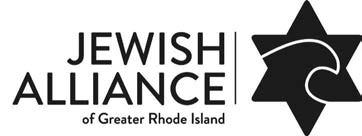

BY STEVEN HOREN
Temple Emanuel’s LGBTQ+ Affinity Group, TEQ and the Jewish Alliance of Greater Rhode Island are pleased to collaborate for the first time to bring an event to the entire community. The two organizations are co-sponsoring a screening of the movie “The Swimmer” at the Dwares Jewish Community Center on Sunday, Jan. 12, 2025, at 1 p.m. Please be aware that this is a film for mature audiences.
“THE SWIMMER” is a 2021 Israeli movie about a gay competitive swimmer and the unique challenges gay people face in competitive sports.
TEQ is now in its third year of programming events for LGBTQ+ people and allies in the community. It began in the winter of 2023 with a screening of the Israeli movie “Out in the Dark.”
Subsequently, the group hosted Temple Emanu-El’s first Pride Shabbat in 2023, featuring Rabbi Mike Moskowitz, Scholar in Residence for Trans and Queer Jewish Studies at Congregation Beit Simchat Torah in New York City. Rabbi Moskowitz taught us about recognition and inclusion of people of multiple genders and sexual orientations in ancient Jewish society.
The second Pride Shabbat (2024) featured Jamie Krass, director of Youth Programs at Keshet. Krass expanded on Rabbi Moskowitz’s teachings about inclusion and acceptance in our ancient society and told us about all of the programming for queer Jewish youth that Keshet provides.
TEQ’s goal is to create safe, welcoming, spaces in which queer Jewish people of all ages and from all movements can authen-
tically be themselves as Jews in the community. As Temple Emanu-El’s Rabbi Michael Fel said “Creating a truly inclusive Jewish community requires us to intentionally create space for everyone and recognize that they are created b’tzelem Elohim —in the image of God (Genesis 1:27). When we honor the divine spark within each individual, our community truly flourishes.”
Together with the Alliance TEQ hopes to open these spaces to the entire Rhode Island Jewish Community. Samantha Kaufman, manager of Adult Programming and Engagement at the Alliance added: “We are happy to partner with TEQ to create awareness and inclusion within our community”
Admission to this event is free, but attendees must RSVP by Friday, Jan. 10. To respond, please email Shoshana Jacob (shosh@ tep.org) or call the Temple Emanu-El office at 401-3311616. Please note, the office is open Tuesday – Friday from 9 a.m. to 5 p.m.
STEVEN HOREN is the co-chair of TEQ, Temple Emanu-El’s LGBTQ+ affinity group.
BY EMMA NEWBERY
The Jewish Alliance of Greater Rhode Island reaffirmed its support for security opportunities in Rhode Island with an open gathering for nonprofit leaders on Dec. 2 . Agency heads and staff got a chance to hear from U.S. Representatives Gabe Amo and Seth Magaziner about the Nonprofit Security Grant Program (NSGP) and how it can support nonprofits across the state.
COMMUNITY LEADERS heard from prior grant recipients, including Rabbi Preston Neimeiser of Temple Beth-El and Adrienne Gagnon, executive director of DownCity Design. As Rabbi Neimeiser put it: "These grants enable us to harden our buildings and not to harden our hearts.”
Gagnon attested to the grant allowing community outreach organizations like DownCity Design “to strike a balance [...] being welcoming, introducing ourselves to new community members who might be interested in our work, but also keeping the kids in our programs safe.”
Additionally, attendees were able to receive updates on the continued fight to protect and expand nonprofit security funding from representatives in Washington. Amo spoke about his personal experience growing up in Rhode Island. “We're here, really, because we share a belief in the same fundamental truth: that everyone deserves to gather, deserves to worship, deserves to learn,
deserves to be in community without fear, without fear for safety,” said Amo.
The congressman urged nonprofit leaders to leverage their close relationships and bias incident intervention work to make the case for state-funded security: “That fear that penetrates, that stays with you, lasts beyond any particular incident,” acknowledged Amo, “but what it does is it provides a backdrop [...] for our participation fully in the things that we believe in.”
Last cycle’s applications highlighted the continued need for support for Rhode Island’s nonprofits. In 2024, the NSGP program awarded 17 grants, totaling more than $2.2 million for nonprofits in the state. This amount accounted for only 43% of the total applicant pool, leaving about 4,000 applications unfunded.
Amo is determined to shore up more support for the upcoming cycle of funding: “We collectively do not accept a situation
where more than half of the applicants are denied the resources they need,” he explained. “That's why we have partners in our delegation who are going to fight for every dollar that's possible: our senators.
“And for those who aren't here today,” he added, “we'll make sure they get the word, because we've got some work to do.” Amo and Magaziner already have a head start. On Oct. 1, the U.S. Department of Homeland Security announced the release of an additional $210 million for the Nonprofit Security Grant Program (NSGP), thanks to a bill supported by both Magaziner and Amo, H.R.815, in April of 2024.
Rep. Seth Magaziner echoed Amo’s intimate ties to the Rhode Island community and the importance of understanding the landscape of extremism and security in the U.S. today.
"Your job as the leaders of your organizations is to worry about safety so that others don't have to,” said Magaziner. “I want to thank all of you for stepping up and taking that mantle of leadership.”
“My children, Max and Lucy, go to daycare right below us, and particularly after Oct. 7 and the spike in antisemitic violence across the country, I often found myself thinking about them, and found a lot of solace in the fact that here at the JCC, Adam [Greenman] and his predecessor and their team
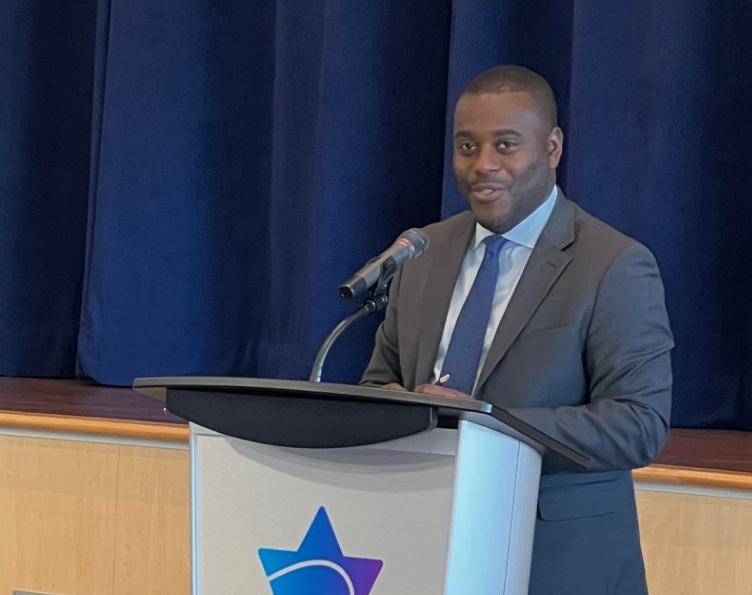
have been taking advantage of this [NSGP] program for a long time."
Magaziner echoed the somber statistics that most attendees were familiar with: “Over the last half decade, for the first time in a long time, more Americans have been killed by domestic extremists. And the most common motivation when a motivation could be identified was racially and religiously motivated extremism, and it's a very different and very tricky kind of threat pattern."
The congressman urged past participants to spread the word and interested applicants to contact representatives from the Rhode Island Emergency Management Agency (RIEMA), who can help with application guidelines and details, as
well as with the allocation of funds. Denise Manni of RIEMA attested to the importance of seeking out more information about the opportunity, even if agencies weren’t sure about their eligibility: “Make those applications strong so that FEMA can hear you, really.” Applications for supplemental funding on Dec. 4, 2024, and close on Jan. 15, 2025. Visit the link below to learn more about grant opportunities in Rhode Island: https://controller. admin.ri.gov/grants-management/state-rhode-island-grant-funding-opportunities.
EMMA NEWBERY (enewbery@ jewishallianceri.org) is a staff writer and podcast host for Jewish Rhode Island.

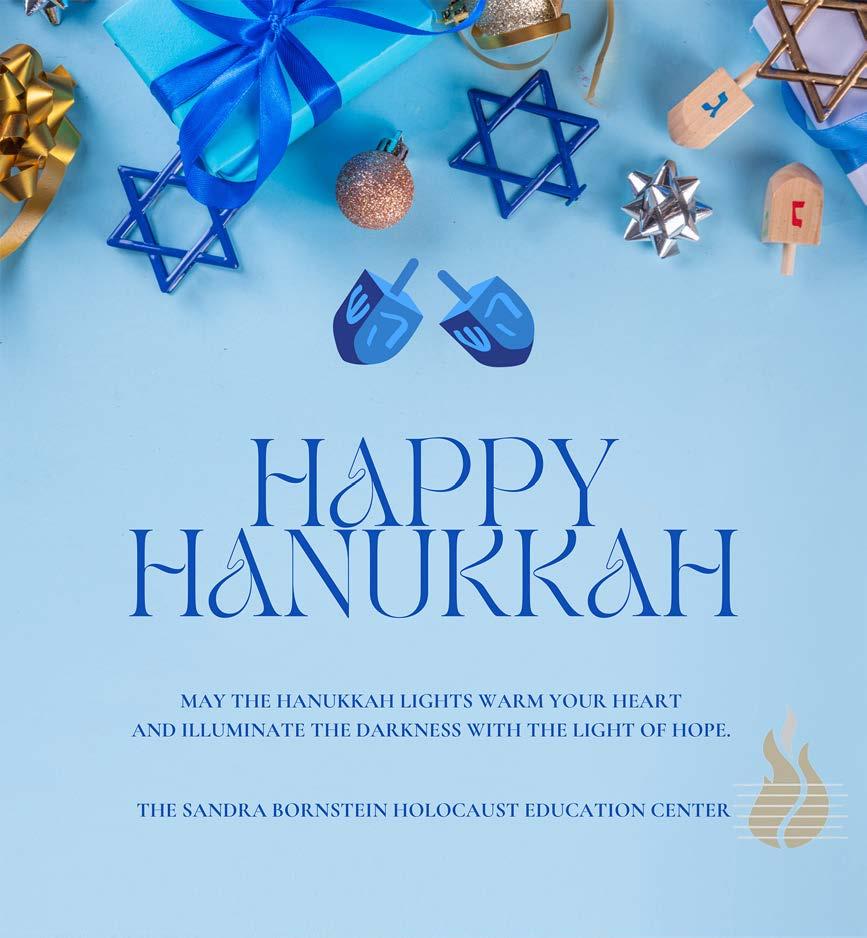






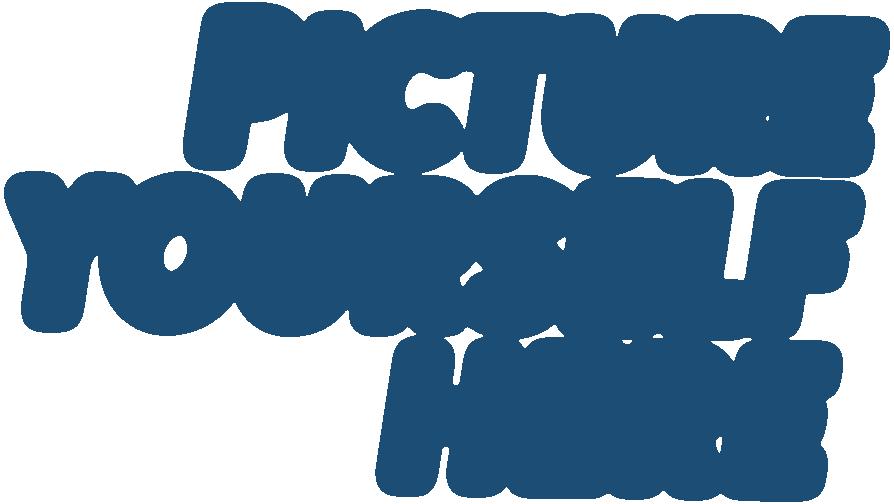



HOWIE BROMBERG recently spent several weeks volunteering in Israel. Here he is picking pomegranates. There are many opportunities to volunteer in Israel through groups and individually. You can read about Bromberg’s experience in the January issue of Jewish Rhode Island!
‘The Quiet Village’
PLEASE JOIN the Sandra Bornstein Holocaust Education Center for our Winter Baxt Lecture at Temple Beth-El on Dec. 8 at 10 a.m.
This year, we are presenting a two-part series on the upcoming documentary
“The Quiet Village” about the history of Chelmno, the first death camp.
SBHEC president Professor Michael Bryant, a producer and featured historian on the film, and director Ashton Gleckman will discuss the history behind the film. Gleckman is best known for his
eight-part series “Kennedy,” which explores the life of President John F. Kennedy. “The Quiet Village” is the first film of its kind; there have been no other documentaries made about Chelmno. The lecture will also offer a behind-thescenes look at the filmmaking process, which brought the duo to England, Germany and Poland. To RSVP, please visit the SBHEC website at bornsteincenter. org or call 401-453-7860.
Submitted by Sandra Bornstein Holocaust Education Center



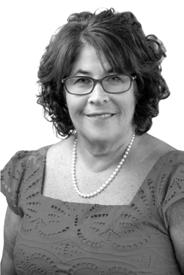

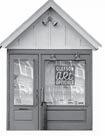














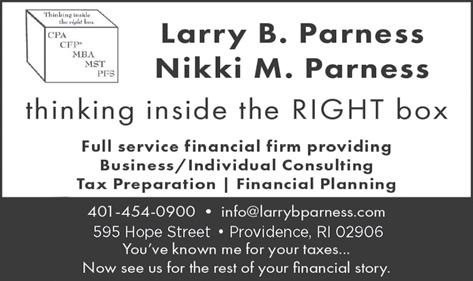

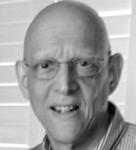
Seth Chernick, 67 WESTON, MASS. – Seth A. Chernick of Weston, formerly of Providence, passed away on July 21, 2024, after defying a terminal diagnosis of widely metastatic gastric cancer for over five years. He was a proud graduate of Brown University and Northwestern’s Kellogg School of Business and had a long career at Fortune 500 companies in a remarkable variety of roles including consulting, strategy, Lean Six Sigma, project management and business-to-business sales operations – most recently at CVS Caremark in Woonsocket. He was known for his work ethic, energy, enthusiasm, intellect, curiosity and feisty spirit. He leaves his wife of 33 years Randee L. Cassel (also of Weston, formerly of St. Louis), a retired attorney, and two adult children, Matthew P. Chernick, a teacher, and Dr. Rebecca E. Chernick (Dr. Alexander “Ian” More), an anesthesiology resident; a brother Michael J. Chernick of Montpelier, Vermont; his aunts, Ellen (the late Harold) Moss and Marsha (the late Dr. Warren) Chernick; his von Wettberg and Cassel sisters and brothers-in-law and their families; and many beloved cousins, colleagues, former classmates and friends. In addition to his parents, he was predeceased by his
in-laws, Irving and Josephine (Fishkop) Cassel.
Seth was born in Providence to Melvin A. Chernick, a respected Providence attorney, and Shirley (Markowitz) Chernick, a homemaker, and raised on Doyle Avenue on the East Side, a short walk to both the Brown University stadium, where he eventually performed clarinet in Brown’s notorious scatter band, and Temple Emanu-El, where the family worshipped regularly and where he became a bar mitzvah. For many years the family summered on Nantasket Beach in Hull, Massachusetts, where his mother was born, and where his maternal grandparents, the late Dan and the late Esther (Soskin) Markowitz, owned and operated Dan’s Deli a popular fixture on the beach.
Seth attended Providence public schools and was proud to have played in Rhode Island’s Junior Symphony. He graduated from Classical High School, where he became passionate about and excelled in Latin, science and math. During his senior year at Classical, he was accepted into a program at Brown to take freshman computer classes in the Applied Math department. He would go on to graduate among Brown’s first class of Computer Science degrees in 1979.
The son, spouse, father and uncle of Brown graduates, he remained “ever true” to Brown, assuming a variety of alumni leadership, fund-

raising, reunion, donor and volunteer roles throughout his life. He was an Eagle Scout, having followed his father, his two Chernick uncles, and his brother into the Boy Scout program and he attended Camp Yawgoog as both a camper and a leader. He served as assistant scoutmaster in Weston where his son Matthew also earned the rank of Eagle Scout as the third generation of Chernick men to do so. Seth retained a lifelong passion for technology and an avid interest in a variety of leisure sports and recreation, Boston sports teams, food and travel.
The family wishes to acknowledge and thank the extraordinary staff at Dana Farber for the gift of their care and for his several years of relatively good health following an unexpected and grim diagnosis, and his team at CVS Caremark.
Donations may be made to the Chernick Family Fund at Brown University, c/o Gift Cashier, P.O. Box 1877, Providence, RI; or to The Center for Esophageal and Gastric Cancer, Peter Enzinger, MD, Director, Dana Farber Cancer Institute, Division of Philanthropy, 10 Brookline Place, Brookline, MA 02445.
Beth Dworetzky, 68
RICHMOND, R.I. – Beth Ann Dworetzky passed away on Nov. 30, 2024, at home, surrounded by her family. She was the beloved daughter of Philip and Florence Dworetzky of Westchester County, New York, and wife to Kevin Friedland of Richmond.
Born in Yonkers, New York, she had lived in Richmond for 20 years, previously living in Hadley, Massachusetts. She completed undergraduate studies at the University of Vermont and earned a master’s degree from the University of Rhode Island. She worked in the area of healthcare access, in particular, in the provision of care for children with complex health needs. She derived great satisfaction in helping parents navigate the healthcare system. She recognized the need for parents to be parents and continue to nurture their children despite facing tremendous challenges. Her contribution also included authorship of numerous journal articles and book chapters that communicated her insights to a global audience. It was with great pride she shared recollections of her son, Zachary Friedland, who
passed away in 2021. Zachary was a classical music composer, who served as a strong advocate for new music and other composers. He founded the Rhode Island Recording Ensemble (RIRE), which he ran with fellow Rhode Island composers. Contributions may be made to: The Nature Conservancy, 159 Waterman St., Providence, RI, 02906 (add “Zach Friedland Memorial” to the memo line).
Dr. Leslie Cohen, 73 CHICAGO, ILL. – Dr. Leslie R. “Les” Cohen died Nov. 23, 2024. He was the beloved husband of 52 years to Francine Cohen (nee Brandwein). He was the dear father of Daniel (Shana) and Andrea (Jared) Charrette. He was the proud grandfather of Eli, Zoey and Eliana. He was the cherished brother of Marla (the late John) Ashford and Mitchell (Beth Mcelroy) Cohen. He was the fond uncle of Ilana (Steven) Dorsey, Michael (Allie) Brandwein and Mark (Jiwan) Brandwein.
Les graduated as valedictorian of Niles North High School (Class of ’69). In the summer of ’68, he was a research student at the Jackson Laboratory in Bar Harbor, Maine, solidifying his desire to join the medical profession. After attending The Johns Hopkins University, the University of Chicago, as well as the Pritzker School of Medicine, he became a physician, specializing in radiology. He began his practice in 1980 in Flint, Michigan, where he also served as an assistant clinical professor at Michigan State University, mentoring and sharing his expertise in interventional angiography.
In 1988, Les was appointed chairman of the Imaging Department at Sturdy Memorial Hospital in Attleboro, Massachusetts, a position he held with dedication for 20 years. After an impressive 43 years in practice, Les retired in December 2023, leaving behind a legacy of excellence in his field.
Les and Fran raised their family in Warwick. They were privileged to own a boat that allowed them to travel to Cape Cod and the Islands, Long Island and Connecticut.
Les was an avid golfer, competitive tennis player, avid sports fan, loved poker and backgammon. He loved reading both fiction and nonfiction. Les took great pride in his family’s closeness. He will always be a part of their
soul and hold a special place in the hearts of all who were honored to call him a friend. Contributions may be made to The Jackson Laboratory 600 Main St., Bar Harbor, Maine 04609 www.jax.org or to The Pritzker School of Medicine The University of Chicago Medicine 5841 South Maryland Ave., Chicago, Illinois 60637 pritzker.uchicago. edu/.
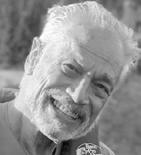
R.I. – Marshall Goldberg, of East Providence, passed away Oct. 19, 2024, at HopeHealth Hulitar Hospice Center in Providence.
Born in Providence, he was the son of the late Abraham and Selma (Blum) Goldberg. A graduate of Pawtucket West High School, Class of 1964, Marshall went on to earn a bachelor’s degree from the University of Rhode Island. A natural born salesman, he sold marine motors for Johnson Outboard in the 70s before going to work with his cousin, Bob Roy, at Jofran Inc., where he became sales manager for New England. He loved being on the water. From waterskiing to racing power boats to leisurely boating with family, he was never far from the next aquatic adventure. Through the highs and lows he was a passionate Red Sox, Patriots and Celtics fan. He was a lifelong congregant of Temple Emanu-El in Providence.
Most of all he was a devoted father – always there for his kids’ games, tournaments and school events. He was a beloved Pops to his grandkids Shaun, Summit and Oscar. He is survived by his loving partner, Mary Jane Mahoney, with whom he had been nearly inseparable since they met in 2019; his son, Jesse Goldberg and his partner Maggie Crawford; his daughter Rebekah Ortell and her husband, Justin; and his former spouse, Elizabeth Goldberg.
Contributions may be made to the Alzheimer’s Association, 245 Waterman St. #306, Providence, RI 02906.
R.I. – Richard B. Goldfine, of Warwick, passed away on Oct. 28, 2024, at home, surrounded by his loving family. He was the husband of Suzanne (Volinetz) Goldfine, with
whom he shared 56 years of marriage.
Born in Woonsocket, a son of the late Nathan and Marian (Kagan) Goldfine, he lived in Governor Francis Farms for over 50 years.
A graduate of Hope High School (1962), Richard earned both a bachelor’s degree (Political Science) and a master’s degree (Urban Planning) from New York University. After a stint on the Governor’s Energy Task Force within the Department of Transportation under Governor Noel, Richard left government service for the private sector and served as an investment counselor for many years.
Richard was a former president of the Hebrew Free Loan Association and served on their board of directors for many years. He volunteered with Meals on Wheels delivering kosher meals to homebound local residents, as well as volunteering at the Hope Health Hospice Center in Providence. In addition, he was very popular with his clients at the Village Common of Rhode Island, transporting them to medical appointments as well as mahjong games and beauty parlor appointments. Richard enjoyed traveling, particularly to visit his children and grandchildren in Vermont and Florida.
In addition to his wife Suzanne, Richard is survived by two sons, Jesse Goldfine and his wife, Tracy, of Stowe, Vermont, and their children Max and Grace; and David Goldfine and his wife, Dena, of Lakeland, Florida, and their children Jamid and Menen; and his brother Charles Goldfine of New York City and his partner, William Sacrey.
Contributions may be made to The Leukemia & Lymphoma Society, Donor Services, P.O. Box 22324, New York, NY 10087.
Mildred Heuberg, 97
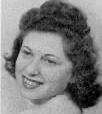
LAS VEGAS, NEV. – Mildred “Millie” Eve Grossman Heuberg passed away peacefully at home on Nov. 8, 2024, in Las Vegas. She was born in New York in 1927 to the late Rose Kenarak Grossman and Louis Grossman and was predeceased by her husband Sol Hyman Heuberg and her brother Morris Grossman. She was a longtime resident of Providence, where she was
married to Sol in 1948, and Springfield, Massachusetts. Later in life, she moved to Nevada to be near her son, Lewis Ira Heuberg, and grandchildren, Melanie Heuberg and Matt Heuberg, all of whom survive her. She was a devoted daughter, wife, mother, grandmother and aunt and will be missed by all.
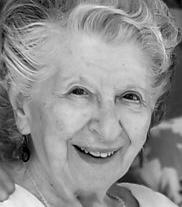
Elaine Hoffman, 97 PROVIDENCE, R.I. – Elaine Hoffman died Nov. 15, 2024, in Providence. She was the beloved wife of the late Dr. Melvin Hoffman. Born in Chelsea, Massachusetts, on June 4, 1927, Elaine moved to Providence before her first birthday. Daughter of the late Irving S. and Etta (Cohen) Chandler, Elaine lost her mother at the age of 11, after which she took care of the house for her father and two older brothers, and later her two half-sisters when her father remarried.
After completing Hope High School in Providence and a secretarial course, she took an office job. In 1945, she was introduced to Melvin Hoffman, who had been shot at Iwo Jima and was recovering at Newport Naval Hospital. Elaine married Melvin on July 4, 1948, after which he completed his medical training, first at Hahnemann Medical School in Philadelphia and then at the Rhode Island Hospital. They lived in Cranston for several years, building a family with three children: Eric (born 1951), Phyllis (1954), and Andrew (1956). The family relocated to the East Side of Providence in 1960.
For over 40 years, Elaine oversaw the recording and distribution of books for the blind, the Talking Books program run through Temple Beth-El. A dedicated homemaker, Elaine belonged to several women’s groups: the JHA Women’s Association, Temple Beth-El’s Sisterhood, Hadassah, and served as an officer with the Jewish Council of Women, B’nai B’rith and The Miriam Hospital Women’s Association. As the children grew, Elaine completed her college degree and worked for a series of psychiatrists and psychologists conducting research.
She traveled extensively, especially after her husband’s accidental death in 1984, going on trips to Europe, Asia
and across the USA. This experience led her to become a travel agent. In 2006, she moved to Laurelmead, an independent living community on Blackstone Blvd., where she served on many committees and later became the resident canasta teacher.
Frequently surrounded by family, Elaine kept in close contact with her siblings, children, grandchildren and great-grandchildren. In her last days, she was attended by Eric Hoffman of Bala Cynwyd, Pennsylvania, Phyllis Hoffman of El Cerrito, California, and Andrew Hoffman of Brookline, Massachusetts; and their partners JoAnne Fischer, Charlotte McCaffrey and Deborah Leipziger respectively; as well as former daughter-in-law, Judy Hoffman. She is also survived by her sister Nada G. Chandler of Fairfax, Virginia; and grandchildren Sage Hoffman (and Andrea Hoffman), Cory Fischer Hoffman (and Eli Stogsdill), Mikaela Baumann (and Ema Baumann), Marcus Hoffman (and Rob Fischer), and Alicia Hoffman (and Kelly Farrell). She has three great-grandchildren, Sienna (7) and Arden (5), of Houston, Texas, and Indigo (7), of Bethlehem, Pennsylvania.
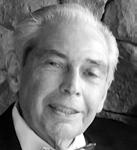
Michael Konstan, 78 NORTH PROVIDENCE, R.I. –Michael Allen Konstan, of North Providence, passed away on Oct. 28, 2024. He was the husband of Carolyn R. Barone. Born in New York City, a son of the late Harry and Edythe (Wahrman) Konstan, he moved to Rhode Island in the early ’90s and lived a short time in Providence, before moving to North Providence 26 years ago. In addition to his wife, he is survived by his brother, Lawrence Konstan and his wife, Gloria, of Queens, New York; his nieces and nephews; and great nieces and nephews. He was the brother of the late David Konstan.
During his years in New York, he worked in sales and marketing for the wine industry. He was a member of the UFCW Wholesale Wine Sales Union Local 18D. His passion was music and songwriting, and during the early seventies released a solo LP of his works for RCA Victor. He will be remembered by all who knew him as a gentleman and possessing an unparalleled gift for comedy and wit.
Contributions may be made to the ACLU of Rhode Island, 128 Dorrance St., # 400, Providence, RI 02903.
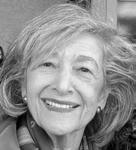
Cynthia Levin, 87 WEST PALM BEACH, FLA. – Cynthia (Katz) Levin passed away on Nov. 1, 2024, at her home in West Palm Beach. She was the beloved wife of the late Milton Levin, with whom she shared 50 years of marriage.
Born on Aug. 19, 1937, in Everett, Massachusetts, Cynthia was the daughter of Celia “Chippy” Katz and Dr. Harold Katz. She resided in Chelsea, Massachusetts, until her marriage to Milton in 1961. They moved to Providence. Cynthia earned a Bachelor of Arts from the University of Massachusetts – Amherst in 1959, followed by a Masters of Counseling from Rhode Island College in 1981. She was an active member of the community throughout her life, serving as a volunteer at The Miriam Hospital in Providence, an intern at Woonsocket Family Health & Services, a counselor to women at Planned Parenthood and a member of the congregation at Temple Emanu-El.
Above all else, Cynthia was devoted to her children, her husband and her friends. Her joys in life revolved around spending time with others, and experiencing what life had to offer. Some of her most cherished hobbies included traveling, wine tasting, book club, playing mahjong and entertaining her family and friends by hosting holiday parties and Shabbat dinners.
In addition to her companion of 12 years, Norman Gessman, Cynthia is survived by her children Miriam Sirota (Michael), Michael Levin (Katie) and Heather Paskin (David); her grandchildren Zachary Sirota (Alexandra), Samuel Sirota, Rena Levin, Noah Levin, Dalia Paskin, Ayelet “Yelli” Paskin and Naomi “Nomi” Paskin; and her great-granddaughter Ava Sirota. She was the grandmother of the late Liat Paskin. She was also the sister of Ann (and the late Joseph) Teitelbaum and the late Claire (and the late Paul) Pincus.
Donations may be made to Temple Emanu-El.
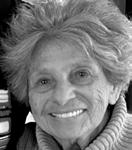
Annabelle Meisler, 92 NARRAGANSETT, R.I. –Annabelle Meisler passed away on Nov. 15, 2024, at Kent County Hospital in Warwick. She was the beloved wife of the late Dr. Walter Meisler. Born in Bronx, New York, the daughter of the late Henry and Rose (Cooper) Silverman, she raised her children in Cranston before moving to Lake Worth, Florida, where she resided for 25 years, then Georgia where she lived for 10 years, before moving to Narragansett two years ago. She was a homemaker and found fulfillment in caring for her family. She also cherished time spending with friends.
Annabelle was a dedicated member of the DNC where she aided in the transition of the Obama administration in 2008. While in Florida for she volunteered for the Compass
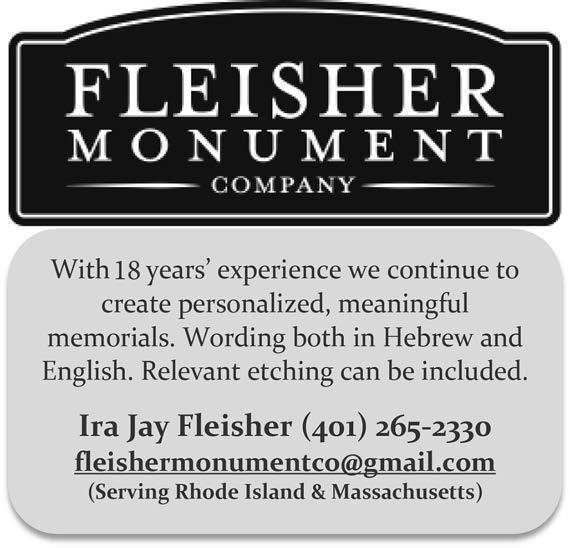
Community Center, which supports LGBTQ+ youth. She also served on various social committees at Parc Alpharetta, Georgia.
She was the devoted mother of Julie Meisler and her partner, Ted Torti, of Narragansett and Bernard and his spouse, Jenny Wade, of Novato, California. She was the loving grandmother of Robbie Canecchio and his wife, LeeAnne, of Alpharetta, Georgia., Arin Canecchio and his fiancé, Allison, of Doraville, Georgia, Daisy Meisler of Seattle, Washington, and Lucian Meisler of Los Angeles, California. She was the cherished great-grandmother (GiGi) of Ava Canecchio, star of the upcoming Disney TV series “That’s so Ava.” Aside from her husband and parents, Annabelle was predeceased by her son, Alan Jon Meisler.
Contributions may be made to an animal humane society of your choice to respect her deep and long held affection for cats.
Arthur Mossberg, 74 WARWICK, R.I. – Arthur M. Mossberg, of Warwick, passed away on Oct. 29, 2024, at the Philip Hulitar Hospice Center in Providence. He was the beloved husband of Frances Sheridan Mossberg. Born in Providence, a son
of the late Jacob and Rhoda Mossberg, he lived in Warwick for most of his life. He was a retired longtime professor at CCRI.
Arthur was the loving father of Marissa Mossberg, and her husband, Jeremy Martinez, of Barrington; and Rachel Mossberg of Warwick and New York. He was devoted to his grandchildren, Eva Mossberg Martinez and Gabriel Mossberg Martinez. He was the dear brother of Fred Mossberg, of Warwick, and Walter Mossberg, of Potomac, Maryland.
Throughout his life, Arthur was dedicated to helping others through secular education and Jewish life. His devotion to his family knew no bounds. As a young man, he launched Project RIRAL, which taught English as a Second Language around the state. Later, he and his team provided adult education services to many school systems in Rhode Island. He capped his career with decades as a professor at the Community College of Rhode Island, where he taught English, Writing and ESL and wrote a college textbook. His students there posted praise of his teaching as “inspirational” and “caring.”
In Jewish life, he was a faithful leader of Temple Am David in Warwick, serving
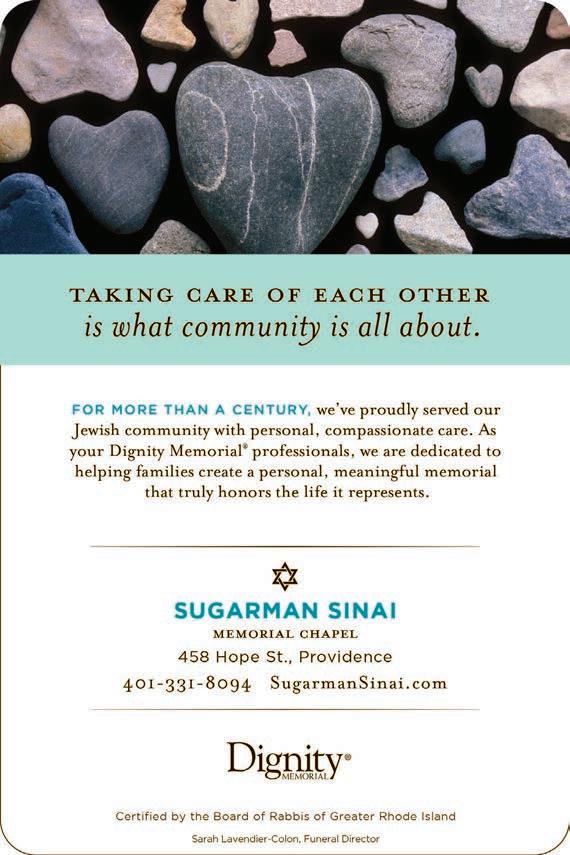
on the board and as treasurer for many years. In this role, he stepped into the shoes of his father, one of the founders and presidents of the temple’s predecessor, Temple Beth Am. He also became the leader of the family on religious matters, presiding over Passover seders and Rosh Hashanah dinners with a balance between tradition and modernity.
The joy of Arthur’s life was his family. He was utterly devoted to his wife, Fran, and to his daughters, Marissa and Rachel. He was over the moon about his grandchildren and they about him. He loved to cook and taught his children to cook. He also loved to travel, had a great sense of humor and a wide circle of devoted friends. And he was an avid New England sports fan, following every teamespecially the Red Sox and the Celtics.
Arthur’s life was a blessing to all he knew and touched. Contributions may be made to the Anti-Defamation League (https://www.adl. org).
Dr. Daniel Rosen, 74 GRAND JUNCTION, Colo. –Daniel B. Rosen passed away on Nov. 13, 2024, at the Ferris Hospice Care Center in Grand Junction Born in Worcester, Massachusetts, the son of the late Harry and Estelle (Goldin) Rosen, he had lived in Montrose, Colorado, for two years, previously living in Delray Beach, Florida, New York, New York, Easton, Connecticut, Fort Smith, Arkansas, and Pound Ridge, New York.
Dr. Rosen was well known in the disability field as an administrator, fundraiser, consultant (both national and international), educator, lecturer, author and advocate of legislation to enhance the lives of and protect the rights of people with disabilities. He most recently served as CEO of International Center for the Disabled, and President and CEO of ARI of Connecticut and New York.
He was the devoted father of Michael and his wife, Melinda, of Durham, New Hampshire, and Jonathan and his wife, Ashley, of Montrose, Colorado.
He was the dear brother of Joel Rosen and his wife, Janice, of Newtown, Pennsylvania, and Celia Marlowe and her husband, Douglas, of Delray Beach, Florida.
He was the loving grandfather of Joshua, Alexander, Oliver and Mabel.
Contributions may be made to the American Association on Intellectual and Developmental Disabilities (AAIDD). https://www.aaidd.org/ about-aaidd/donations

Mary Shindelman, 93 BROOKLYN, N.Y. – Mary Shindelman, of Brooklyn, New York, passed away on Oct. 23, 2024. She was the wife of the late Yuri Shindelman.
Born in Odessa, Ukraine, she was the daughter of the late Yefim and Geniya (Krypnic) Berman. After immigrating to the United States, she and her husband lived in Cranston from 1978 to 1988 and then moved to Brooklyn, where she has lived for over 35 years.
Mary worked for Calibri Jewelry Co. for several years while living in Cranston. After moving to New York, she worked as a home health attendant for over 25 years, helping elderly residents stay in their own homes. She retired after her husband passed away in 2014. Known for her resilience, she treasured the many wonderful years spent with her loving son and family. She will be missed more than words possibly express.
She is survived by her beloved son, Fred Delman and his wife, Elena, of Cranston; two loving granddaughters Stephanie Delman and her husband, Christopher Kaya, of Monroe, Connecticut, and Gennifer Delman of Manhattan; and her great-grandson, Evan Kaya.
Donations may be made to the Alzheimer’s Association, 245 Waterman St. #306, Providence, RI 02906.

PROVIDENCE, R.I. – Irwin “Sonny” Silver passed away on Nov. 28, 2024, at Wingate Assisted Living on the East Side, Providence. He was the beloved husband of the late Lois (Freedberg) Silver. Born in Boston, Massachusetts, the son of the late Morris and Mary (Shprintzen) Silver, he had lived in Providence for nine years, previously living in Framingham, Massachusetts, for over 50 years.
He was a stockbroker with Prudential Securities and an adjunct professor of finance
at Northeastern University, retiring 20 years ago. Sonny earned a bachelor’s degree from Northeastern University in 1957. He was a former member of Temple Beth Am in Framingham as well as an active member of the Brandeis Jewish community. He grew up a devoted fan of the Boston Braves, but converted later in life for the sake of his grandchildren and fully embraced the Boston Red Sox 21st century glorious renaissance.
He was the devoted father of Jeffrey Silver and his wife, Alesa, of Farmington Hills, Michigan; Robert Silver and his wife, Sherry, of Concord, North Carolina; and Allyson Antin and her husband, Frank, of Cranston. He was the dear brother of the late Frances Lewy and her late husband, Stephan. He was the loving grandfather of Lauren Pless (Matt), Rachel, Anna, Benjamin, Phoebe and Jacob. Contributions may be made to The Lois F. Silver Fund for Elementary Faculty Advancement at Maimonides School, 34 Philbrick Road, Brookline, MA 02445; St. Jude Children’s Research Hospital, Ways to give, or the charity of your choice.

Joseph Silverstein, 97 NEW BEDFORD, MASS. – Joseph Herbert Silverstein passed away on Nov. 13, 2024, in New Bedford, MA. Joe was born on March 7, 1927, in New Bedford, the oldest son of the late Harry and Anna (Rubin) Silverstein. Joseph led a life marked by dedication, service and deep family ties.
Joseph’s journey began at Betsy B. Winslow Elementary, followed by the Clark School, and culminated in graduating from the Massachusetts Maritime Academy. His education laid the foundation for his distinguished career as a Commander in the U.S. Navy where he served with honor and distinction.
After his military service, Joe became president of Silverstein’s Clothing Store, a century-old family business in New Bedford. Under his leadership, the store flourished and was a beloved institution known for its commitment to community and exceptional service. His Jewish faith and dedication to his family and community were profound and guided
him through life.
Joe was a man of considerable character, described by many as big-hearted, generous and a shrewd businessman. He was a mentor to many and a friend to all, revered as a family man and a community legend. His legacy is not just in his professional accomplishments but in the wisdom he imparted and the many lives he touched.
Joseph was preceded in death by his wife, Jean Harriet (Goodwin) Silverstein and his son, David Silverstein, and his brother, Bernard. He is survived by his brother, Louis and his wife, Bonnie; his daughter, Lois, and her husband, Merrill; his son, Stephen and his wife, Judy; 8 grandchildren 1 great-granddaughter, and was anticipating the arrival of his second great-grandchild.
Donations may be made to the Harry and Anna Silverstein Fund through Tifereth Israel.
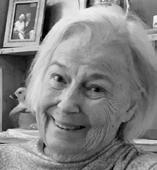
Cynthia Triedman, 90 PROVIDENCE, R.I. – Cynthia K. Triedman, 90, of Providence, passed away peacefully on Nov.14, 2024, after a brief illness, surrounded by her four adult children.
Cynthia lived a full life, rich in love and rooted in family. She was adored by all who knew her – as a mother, a daughter, a sister, a grandmother, an aunt and a friend. As a mother, she was the definition of unconditional love – accepting and supportive; deeply concerned about her children’s happiness without ever being overbearing or judgmental – while also making room for her own quiet time alone and many artistic pursuits. She never demanded attention for herself but was so deeply good and worthy that people everywhere were drawn to her. In all things, she led with her kindness and gentleness, a genuine interest in others, her welcoming smile, and her quiet, keen intelligence.
Cynthia was born on July 14, 1934, in Akron, Ohio to Alphonse Knapp, an ophthalmologist, and Doris (Martin) Knapp, a nurse and then homemaker. She and her two older sisters, Mary Jane and Susie, were raised in East Liverpool, Ohio in a white wood-frame house sur-
rounded by old-growth trees, a formal rose garden, a bountiful vegetable garden, blueberry bushes and a cherry orchard. Cynthia herself was a gifted gardener who – like her mother– loved flowers above all. Indeed, gardening played a central role in her life, and the gardens she created over the years reflected an attention to beauty and detail that made them deeply memorable.
Cynthia attended Mount de Chantal Academy, graduating in 1952, and Rosemont College of the Holy Child of Jesus, in Rosemont, Pennsylvania, earning a B.A. in Fine Art in 1956. After a brief career in art-book publishing in Boston, she married Leonard J. Triedman, a young physician and Air Force captain who went on to become a respected Rhode Island surgeon. The two enjoyed a whirlwind and storied courtship, leading Cynthia to marry Lenny in 1957 and the two of them to settle on the East Side of Providence. Their 64-year marriage was full of passion, endless laughter, children and grandchildren, and a large and ever-growing circle of friends, with whom they traveled, skied and played golf.
For over two decades they lived in Providence, raising their four children there, before moving in the early 1980s to a weathered shingled house in Narragansett, overlooking the bay. The couple also spent significant time in the 1990s and early 2000s in Hilton Head and Bluffton, South Carolina, where Cynthia loved to explore the low country, creating exquisite landscapes in watercolor and pastel. In August 2020, she moved to Wingate Assisted Living, in Providence, where she established deep friendships with fellow residents, caregivers and staff.
Cynthia loved above all else being a mother, grandmother, and – most recently -- great-grandmother. As the family expanded, she took the time to really listen to and get to know her sonsand daughters-in-law and 12 grandchildren, each of whom felt loved and known in unique and special ways. She was well-read and thoughtful, artistic, and ever-encouraging to her large family. Until late in life, she enjoyed walks in nature, skiing, tennis, running, and golf, and was particularly passionate about the natural environment. She and Lenny absolutely adored their many
dogs, whose exalted place in the family pecking order was never questioned.
Cynthia was an accomplished visual artist focusing largely on painting, printmaking, pastels, and collage. In addition to her college fine art degree, she also trained extensively at both the Boston Museum School and the Rhode Island School of Design. Her work was widely exhibited and received numerous jury awards, including winning a juried entry in a National Watercolor Association show in New York City. She continued painting her luminous landscapes and still lifes until the last year or so and was a featured artist in September 2021 at the Providence Art Club. She was an inspiration to her children and grandchildren, several of whom have followed in her footsteps to create art.
Cynthia was deeply engaged with her local and artistic community. She was a longtime member of The Miriam Hospital Women’s Association, chairing the body in the 1970s; the Providence Art Club, of which she was a member for more than 50 years; and the National Watercolor Association. She was also a dedicated supporter over many years of environmental and wildlife organizations. She is survived by her dear sister Mary Jane Jones and her family, of Los Angeles; her four children, John K. Triedman (Susan Hellerstein), Kim E. Triedman (Eric Oldsman), Scott A. Triedman (Mary Jo Kaplan) and Julie B. Triedman (Anthony Mace); grandchildren Hanna, Charlotte, and Sophia Oldsman; Natalie King, Lucy Barrett and Cole Triedman; Nellie, Andrew, and Hal Triedman; James, Mason and Beatrice Mace; and great-grandchildren Isobel, Beau, Josephine, and Leo. She also leaves behind her husband’s daughter Nancy Shalek (James Shalek) and family, to whom she was deeply devoted. She is predeceased by her husband Leonard, her parents, Doris and Alphonse, and her sister Susie O’Brien. Donations may be made to the Providence Art Club, 11 Thomas St., Providence, RI 02903 - https://providenceartclub.org/support/ or to Save The Bay,100 Save the Bay Drive, Providence, RI 02905 - https://savebay.org/get-involved/donate/
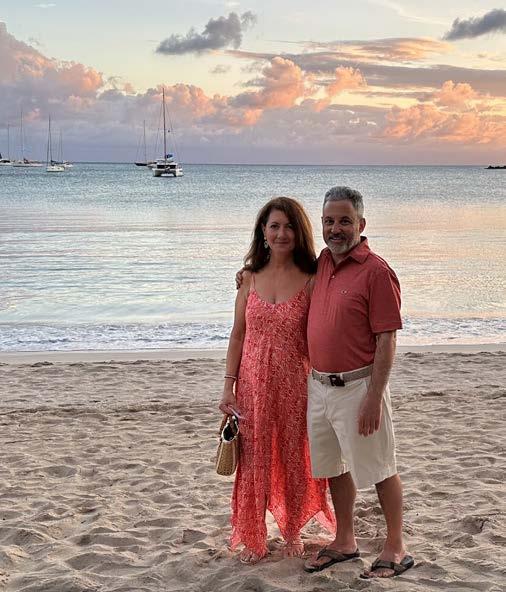
SENA AND ISRAEL YAMUDER of Lake Worth, Florida (formerly of Warwick) are delighted to announce the upcoming marriage of their daughter, Sheryl Ann, to Eric Feigel. The wedding will take place in May 2025 in Palm Beach, Florida. The Yamuders owned Izzy’s Kosher Catering in Warwick for several decades.
Eric is the son of Nancy Feigel and the late Harold Feigel of Summit, New Jer-
sey, and Livingston Manor, New York.
The bride is a graduate of The Wheeler School in Providence, Boston University and the Cardozo School of Law. She works as a privacy attorney for a financial services company, while the groom is an engineer for United Parcel Service.
The couple will make their home in Summit, New Jersey.
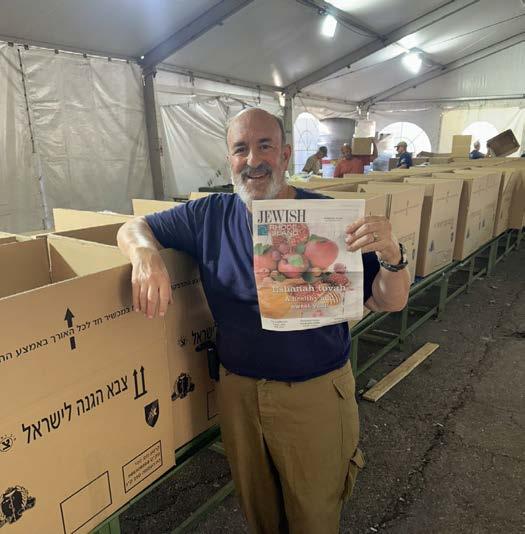
�e most important thing you can do while you’re here is to ensure the world will be better when you’re not.
One of life’s great achievements is the ability to leave a lasting legacy. We can help.
rifoundation.org/legacy (401) 274-4564